Don't wanna be here? Send us removal request.
Text
Day 62, 21st/22nd Oct, En route.
I knew nothing about Doha so looked it up. Doha is the capital and most populous city of the State of Qatar. It has a population of 1,850,000. The city is located on the Persian Gulf which you can see. This was looking down from my hotel room.

Lots of construction work everywhere. Qatar is a very wealthy country since oil was discovered in 1940. Across from my hotel was a new Waldorf Astoria being built. Doha bid and was successful to host the 2022 FIFA World Cup. The country is trying to diversify and make Doha a tourist destination in its own right. One building is the outstanding museum of world status that has been built and designed by the Chinese architect I.M.Pei, who designed the Louvre Pyramid. It is The Museum of Islamic Art.

Pretty flowers in the foyer of my hotel. A bit of colour as the city has a tinge of dust colour to it.

Huge buildings all over.

This building was the Qatar Petroleum headquarters.

A huge mosque. Everywhere was very clean and tidy.

Another mosque.

Sunrise over the Persian Gulf.

This guy’s face was on a number of buildings so I’m assuming he would be the ruler.

The airport which is large and all new since 2014. They have won a number of awards for the airport. It was very nice and I don’t think I have ever been in an airport with so many people looking to help you and they all spoke English. Not too many black robes around.

Inside the airport.

This was a bit different I thought. Lamp Bear is by Swiss artist Urs Fischer and is in the duty free area of the airport. It’s a 23 foot canary yellow teddy bear sculptured from bronze that sits peacefully inside a lamp. It’s supposed to be a playful piece that reminds travellers of precious things from home.

There were a few white robed guys walking around.

Lucky me as I ended up having a spare seat next to me so the flight home was very comfortable. I was happy to be flying for 14 hours as I watched a few movies, slept a bit and felt very relaxed. I great way to finish my trip.
My total cost for the trip was $15,615 which included all flights, trains, buses ferries, hotels, food, drink, entertainment, museums, Matthew etc. I don’t think that was so bad for what I did and how long I was away. I stayed in some nice places.
1 note
·
View note
Text
Day 61, 20th Oct, Doha
It was nice to have a leisurely breakfast and just hang out until I checked out of the hotel and then it was time to head to the airport. I might have been a bit early but that was fine. Last time with my boy. He has certainly looked after me well.

I was flying home with Qatar through Doha. The flight from Oslo to Doha was 6 hours.

The plane was fairly small which I’m not used to for an international flight but being a fairly short flight it was okay. I spent a good portion of it up the back talking to a guy from Pakistan who was doing his Phd in Tromso. He came from such an interesting family and had a fascinating tale to tell.

I realised a couple of weeks ago I had a nine hour layover in Doha. I figured I would just hang out at the airport. The plane got in at 11.30pm from Oslo and then I was leaving at 9.30am the next morning. Fortunately, while I was standing for awhile during the flight I was talking to another passenger and he mentioned that if you had longer than an 8 hours layover Qatar would put you up in a hotel at no cost. So that’s what happened. I was driven from the airport to the Grand Hyatt hotel in the city, about 20 minutes away. I did sleep and then came back around 6 in the morning. Very civilised.

1 note
·
View note
Text
Day 60, 19th Oct, Oslo
Another wet day but it wasn’t going to dampen our spirits. It was Saturday so Matthew had the whole day planned. However, not all went as planned. We had intended on doing a tour of the Parliament building, as they only do them on Saturday, so we were there bright and early to find the tour guide was sick and the tour had been cancelled. Next time.

The Parliament is right in the middle of the city at the end of the park that runs from the palace.

We were so early the streets were pretty deserted. The rain didn’t help.

Seeing we were across from the Grand Hotel we did another tour of the lovely rooms. Matthew had been there before to renew his passport as Australia doesn’t have a Consulate in Norway so someone comes twice a year from Denmark and had set up an office in this hotel.

From the station we caught a tram which took us north of the city and then we caught a bus that took us right up to the top of the hills overlooking Oslo. On top there is a nice hotel and restaurant. Matthew had been up in this area for music concerts and to hike.

The views over Oslo would have been great if the weather was better. You can see the two towers of the Town Hall building in the distance.

It was too wet to walk along the trails so we caught the bus back down the hill a bit to a nice area of houses.

The colours of the changing leaves add to the appeal of the area.

Autumn has really set in. From here we caught another bus going west. You never wait long for any transport in Oslo.

Next stop was to one of the Norwegian Olympic training centres. There were gyms, doctors, physios and a hotel there. Norway only has 5.2 million people but it always dominates the Winter Olympics. Norway has won more medals than any other nation since the first Winter Olympics in 1924. Norwegians say “they are born with skis on their feet”.

Looking through the window to the gym. We thought we saw a couple of Olympians. They looked extremely fit and well built.

Just down the hill from the centre is Sognsvann which is one of Norway’s most popular areas for outdoor life. In summer or winter you can walk or ski the many paths around the lake. Matthew comes here often. I learnt that in Norway there is ‘never any bad weather but just bad clothing’. The Norwegians are out in all weather.

I was surprised how many people were around.

Summer would be great and in winter the lake freezes. My feet were getting wet, I didn’t have the right clothes, so we headed back up the hill to the train which we caught back into the Centre.

Once back in the centre of the city for a break out of the weather and a bit of warmth we checked out the new Clarion Hub hotel which was very nice.

Hotels are always good for a toilet break, a bit of wifi and a rest in their nice lounges.

The hotel only opened this year.

We ventured out again to check out the Octoberfest tent that had been erected on one of the squares. It was only mid afternoon so pretty quite. Matthew came back here with friends at night and it was packed.

The band was yet to start.

The area we were wandering in was were a lot of bars are.

You can see how wet it was.

Matthew seemed to have been to most of these bars.

The statue of Christian IV was I n a square nearby. He was King of Denmark and Norway from 1588 to 1648 and his 59 year reign was the longest of all the Scandinavian monarchies. After Oslo burnt down in 1624, as most buildings were timber, the new town that arose was called Christiania. The city’s name was changed back to Oslo in 1924.

Opposite Christian IV’s statue is the Oslo Dom.

Inside was plainer than many Catholic Churches you see and the paintings have a Norwegian feel to them.

A huge organ was up in one end of the Dom.

Closer look at the ceiling.

The elaborate entrance door. Note the reindeer.

We had another long cafe break and then headed back to the hotel. I was watching silly cat videos on my phone.

Close to the hotel was this famous cafe, Pascal. The owner is a well known pastry maker often featured on Norwegian TV.

A lovely selection in the window. Very expensive, though.

The sun came out for a minute so I took a photo of the new Library from my hotel window. They move next spring. The building is just across from the Opera House. It’s amazing all the new government buildings being constructed.

We spent the last of the day just hanging out at the hotel then dinner. My hotel rate included afternoon tea and dinner which I liked after a long day exploring. Later Matthew went out with some friends and sleep back at his apartment.
0 notes
Text
Day 59, 18th Oct, Oslo
Still overcast and wet underfoot but still nice to walk around and this morning I retraced my steps around the harbour. The ferry terminal wasn’t far from my hotel.

I saw the little driverless bus again going up and down.

The castle which dominates the skyline in this part of the city.

Nice artwork along the terminal buildings.

Piercing eyes.

Loved these.

Looking along the dock.

This is Tram 12 which I have ridden often. It goes along in front of the Town Hall.

Part of the courtyard buildings at the back of the Town Hall. They are built in the same Brutish architectural style.

Pretty flowers.

The Town Hall is a very distinctive buildings. Inside the walls are all decorated with a Norwegian folk art so it’s a treat to see but today the building was closed. I have seen it before but worth another visit next time.

Along the walls going to the entrance are scenes of legendary gods in Norwegian folk lore.

The Parliament building in the centre of the city.

The Grand Hotel as the name suggests is one of Oslo’s fanciest hotels so it was worth a visit.

It was very beautiful inside and the floral arrangements lovely.

The lounge were I sat for awhile. I often call into nice hotels for a toilet stop, a bit of wifi and a rest if needed. The lounges are usually very comfortable to sit in. I particularly liked the furnishings in this hotel.

The main dining room.

The hotel also had a rooftop bar which I checked out.

Views towards the Town Hall and harbour.

Looking along the Main Street.

Love these flower pots. They are also effective barriers in case of a terrorist attack.

Christian Krong was a painter of note and this square is named after him.

A nice passageway.

A bit of country in the city souvenir shop.

Solid building in the centre.

Outside the main newspaper office.

This bus stop is no longer used as it was the site of the bomb attack in 2011. It has been left as part of the Memorial.

Outside the newspaper office, in Oslo, they used to put the pages of the paper up everyday behind a glass case. On this day the news could not have predicted what was to follow later in the day. It was Friday, 22nd July, 2011. This was the day a bomb went off in front of the government buildings across from the newspaper office and before a gunmen killed 69 people and injured 564 people on Utoya Island. The glass in the cabinet was shattered by the bomb and has now been left as part of the Memorial to the Attack. A lot of Matthew’s friends were the age that these young people were then so most know someone affected by this attack.

The area where the bomb went off. This area is going to be redeveloped so the Memorials are only temporary.

The list of the 69 people who were killed.

One of the main churches.

This is the Oslo City Library.

The children’s section was fabulous. So bright and comfortable. I was talking to one of the Librarians and said I was just looking so she took me upstairs and explained how the Library is moving to a new location in the spring.

Looking down onto the main library area.

It was a very nice space.

Looking the other way.

Matthew took this photo before I realised he was there. It’s how he usually found me after work. In a cafe on my iPad.

Today we went shopping as Matthew wanted a new coat.

The coats are beautiful as obviously everyone wears them so the choices are varied. We found him a great coat.

The hotel I’m staying in does afternoon tea and dinner so I quite like that as it saves looking for somewhere to eat that’s not so expensive. Plus by the end of a big walking day I’m easy. A cup of tea and muffin in a cafe costs around $16 and that’s in a chain cafe which is nice but a bit cheaper than other cafes.

0 notes
Text
Day 58, 17th Oct, Oslo
Still a bit wet out and overcast but I didn’t really have to bring the umbrella out. I just had to watch for the puddles. I had been staying at Matthew’s place but that meant he was on the lounge so not that comfortable. He lives in a different place to when I was in Oslo before and that place had plenty of room. I’m now in a hotel near the Opera House and Matthew is staying there with me. As I’ve mentioned before anyway in Oslo is close to transport so it was easy to get a tram to the Vigeland Park. All the parks are beautiful with the changing colours.
Gustav Vigeland was in charge of the design and architectural layout of the park. This park was mainly completed between 1939 and 1949.

The Park is the world’s largest sculpture park made by a single artist, and is one of Norway’s most popular tourist attractions. It was Gustav Vigeland’s lifework with more than 200 sculptures in bronze, granite and wrought iron.

The crying baby is a popular photo op.

This one is of a girl with long hair.

The red leaves on the bushes make a statement.

The monument of bodies is the main apex of the structures.

So many different shapes and sizes.

It’s pretty unusual and at first some people objected to the naked bodies but that didn’t last long.

There are female gates on one side and male on the other.

Lovely walkway.

From the park I had a bit of a wander of the shops around Majorstrun where Matthew used to live. I went into a Salvos shop which for second hand items was very expensive. From there I caught the No 19 tram through the lovely area behind the palace to the Palace itself. Unusually the grounds around the palace are very open to the public.

The changing of the guards was happening while I was there.

They all looked so young but Matthew was telling me later that most are straight out of school. Norwegian students are given a few options for the 12 months after leaving school and many go into the army as it gives them great leadership skills. It’s a sought after course.

On the southeast corner of the Palace Square is the guardhouse for His Majesty The King’s Guard. It was constructed in 1845 and is one of Norways first buildings in the Swiss Chalet style.

There was quite a procedure to the changing of the guards but a bit of music would have been good with the marching.

It was impressive to watch.

Beautiful colours in the park around the Palace.

These pots of colourful flowers line the Main Street from the palace to the shopping area.

I had a walk around the Opera House. You can walk up on its roof as well.

There is a sculpture in the water in front of the Opera House that looks like an iceberg.

Another view of the Opera house. You can see the new Munch Museum building to the right. The buildings along the strip next to the Opera House are known as the Bar Code buildings due to their colours and window shapes.

Further along the water front is an area of cafes, bars and stages for music performances.

It was a bit quite today but over the summer and on the weekend it is a hive of activity.

This structure is like the structures used in the north of Norway to dry fish. The artist has taken 1200 shirts from people in Finland and Oslo to connect them

Close up of the shirts. “In every shirt there is a story because someone with a warm heart has been wearing it. All kind of people are together here, but we are still the same, we are no wiser than fish.. we act like fish, always going in a group, following each other in the same direction, like a shoal of fish.” Artist Katrina Kaikkonen

The shirts flapping in the wind make a good sound as well.

When Matthew joined me we had planned on catching a ferry to one of the islands and walking to the other end to see the cannon installations but it was too wet so we decided to just do the one hour route around the islands without getting off. I have done this a couple of times and it’s always a nice trip. It’s covered by the transport card everyone has. Leaving the port

The Town Hall. It is a very distinctive building and easy to pick out from a distance.

The castle from the water.

Matthew looking towards the city.

Coming into dock on one of the islands.

They look so cute these little houses.

This is a little church out on the point.

No one seemed to be in any of these houses as we couldn’t see any lights on. Most are used in the summer or on weekends. A lot of Matthew’s friends families have cabins around Norway. Some have summer and winter cabins or more commonly winter cabins in the mountain areas.

The ferry we were on. They just slide into the docks so don’t have to be tied up. Normally the B1 goes from around the other side of the harbour, not far away, but they are doing work on the dock.

This is a trial for a driverless bus to take people along the water front. When we got off the ferry one was right in front of us so we decided to go for a ride. There is someone on it to explain how it works, though.

This is the area where the cruise ships come in so eventually the driverless bus will be bigger and be able to carry more people as there can be 5000 people or more on some of the cruise ships.

It was getting pretty cold at this point. Next to where I was standing is a big food hall which has lots of eating venues but it was all closed. Matthew said it was a fun place to eat. There is often music as well.

These big ferries are coming in and out everyday. They connect with Denmark, Sweden and Germany.

1 note
·
View note
Text
Day 57, 16th Oct, Oslo
I was inspired by a friend or reminded by her to visit the libraries in Oslo. This was the National Norwegian Library in Solli which wasn’t far from Matthew’s place and on a tram line. In summer it’s covered in green leaves and would have looked spectacular a few weeks ago covered in red leaves. You can see the last on the corner.

Nicely painted scenes, in the Norwegian folk style, on the stairwell.

A bust of Henrik Ibsen who is one of Norway’s most famous authors was on display with other famous authors.

The Library had a display of old book binding techniques and some very old books. These ones were from the 1700’s.

An old printing press in the middle of the display.

I love seeing these groups of little kids all over the city. They are always out and about with their minders. They are so cute.

After the Library I caught bus No. 31 out to where Matthew works which is an area of interesting new buildings next to the big Telenor Arena. Matthew works for Kvaerner.

In his building they have a museum of structures the company have designed and built plus a lecture room where school students come to learn about the company.

Kvaerner is an engineering company which does a lot of work on the oil fields.

Pretty blown away with what Matthew has been working on. Kvaerner, for the last few years, have been working on the Johan Sverdrup Field building the platforms needed to start drilling one of the largest oil fields on the Norwegian continental shelf. So far four platforms have been built and they all connect. It’s been a massive undertaking. They started drilling just this week. The money that Norway will get from this field is enormous. The government gets a significant proportion which is banked for the future of the country. They have been doing this for years. That’s why people in Norway have such a good lifestyle. Matthew and his boss have been responsible for the foundation design of the fifth platform.

Matthew is standing next to the fifth platform which is yet to be built. Very proud of his achievements.

The office building is close to the water so we went for a bit of a stroll. Autumn has definitely arrived.

It was also a bit wet and grey looking over the fjord.

Most big business have good canteens for their workers. They have a variety of choice and all pretty healthy. Today was fish. Workers in Norway get very well looked after.

Our lunch and a packed sandwich for later.

Matthew’s main office building.

After visiting Matthew I stopped at some old warehouses, now shops for a look. All too expensive for me to buy anything.

Nice buildings, though.

The Opera House lit up at night. It is a striking building being built right on the water. You can walk up on its roof which gives you a good view of the buildings around the area. All fairly new.

This was looking up from the foyer at the different levels of the theatre.

The main foyer. It was a full house so Opera is very popular in Norway.

The opera house is very modern with a lot of timber.

Matthew getting ready for the opera.

We had great seats and a clear view of the stage.

Performances always seem to get better as the opera continues and as you get more involved with the story line. This performance ended on a very high note even though the story ended with a death. The singer who played Rigoletto was excellent. I also saw a Rigoletto in Milan but the scenery and costumes there were from the time and period the opera was written. This Rigoletto was done with a Norwegian background and costumes. It was still sung in Italian and we had English translation in front of us but looked very different.

1 note
·
View note
Text
Day 56, 15th Oct, Oslo
Today, I had off. It’s the first day of my travels I’ve slept in and done nothing. It was a very wet day so I just pottered around Matthew’s place until he came home. It was enjoyable being able to do nothing. Once Matthew arrived from work, he finishes at four, we headed to the bus stop.

Our excursion, today, was up the hills on the eastern side of the city. You get a good view of the harbour and port from this vantage point.

The buildings you can mostly see are all fairly new and make a statement with their colouring. The light grey high glass building is the new Munch Museum. The Munch Museum’s four collections, that I saw on Monday, are all going to this new waterfront Museum. The new building will provide them with ten times the space they have now so they can exhibit a lot more of the art they own. Oslo seems to be going ahead in leaps and bounds with all the new buildings. It’s a very wealthy country.

Up on the hill is the Ekebergparken Sculpture Park which is a scenic area full of very interesting sculptures. The Ekeberg escarpment was purchased by the council in 1889 to provide a lovely forested park in beautiful surroundings and with fresh air so the working class people could escape from the hurly burly of the city and its polluting factories. There were already parks on the western side of the city so this park was to match them. More than 40 sculptures are installed and many of them have women as subjects. Rodin and Salvador Dali are just two world renown artists featured. This was one of the first sculptures you see as you enter the park called ‘Deep Cream Maradona’. A bit confronting.

This one was called ‘Marilyn’.

On the edge of the park is Ekeberg Restaurant which was built in 1929. This building is now listed as it is regarded as one of the finest examples of functionalist architecture in Norway.

‘Chloe’

‘The Dilemna, should I jump or not’.

‘Dreaming women’

‘Klang’. This one was making noises and the screens were changing.

Each sculpture was so different so it was great wandering along the trails finding some of them. It was getting to late to discover them all, though.

‘The couple’. This one was hanging from a tree.

We also found the location were Munch was inspired to paint ‘The Scream’. He took the atmosphere of an intense sunset, at this point, during an evening scroll with friends and transformed it into one of the most iconic works in modern art. I wasn’t very good at reproducing the right looking face even with a few tries. This was my best effort.

Matthew did it well. The background has changed a bit since 1910 when the painting was painted as now there are all buildings in the background.

From the park we caught another numbered bus, as we were on the other side of the hill, back to Central then hopped the tram back to Matthew’s place. You are never far from some form of transport in Oslo. Near where we got off there was some sort of filming going on. We stood and watched for awhile. It was cold and wet but people were in their swimmers.

We found out they were filming a promo for a Norway version of ‘Love Island’. All the young people ran towards the gates on ‘action’ but some were shut out. I assume a tropical island scene will replace the blue screen when editing is completed.

There are such a lot of interesting things to do around Oslo. I would love to revisit the park on a nice day but it was still a lovely being out with Matthew. He has looked after me well.
1 note
·
View note
Text
Day 55, 14th Oct, Oslo
There are still a few places I haven’t been to in Oslo and the Munch Museum is one of them. I could catch the No. 20 bus almost from Matthew’s front door to the Museum’s front door. The bus did a circle north of the city so the route was interesting to travel along. I have a Senior weekly transport card which, for Norway, was cheap so I can go on buses, trams, ferries and trains which are all over the city and go all the time. It was wet so a good day for a museum.

A self portrait of Edvard Munch. When Munch died in 1944 he had no descendants so he bequeathed nearly 28,000 artworks to the city of Oslo. His collection of paintings, prints, drawings, photographs, sculptures and texts were scattered all over his property at Evelyn. Today, Munch’s bequest is one of the world’s most sort after art collections and is at the heart of the Munch Museum.

Munch’s paints and brushes.

‘The Scream’ is perhaps Munch’s most famous painting. Munch produced several versions of it, two of which are paintings. One early version belongs to the The National Museum in Oslo. This version is thought to have been painted in 1910.

I found this painting very beautiful. So many of his paintings were wonderful to look at.

In 1988 this painting was taken out of the museum through a gap between the pine panels on which it had been hanging. The panels had been designed to open in order to admit daylight. The thieves simply smashed the window behind the panels, prised apart the panels and helped themselves to the painting. It was returned to the Museum some six months later.

The four art collections owned by the Munch Museum have little in common. They have never previously been exhibited together. There is one unifying factor, which is that some of them are landscapes.

Beside Munch there were paintings by Ludwig Ravensberg. He had drawn and painted from his youth and finally had his first exhibition at the age of 83. He died four years later leaving his life’s work to his wife who took care of his work and organised more exhibitions. On her death in 1972 she donated his entire collection to the Munch Museum.

Included with the paintings were note books and other books or photos that inspired them.

Amaldus Nielsen. The children of Nielsen donated 286 of his paintings to the City of Oslo in 1932 so they could be looked after and displayed in suitable premises. Eventually, the paintings found a permanent home at the Muneum.

Nielsen’s paint box.

Rolf Stenersen was only 19 when he bought his first work of art. Over the years he collected many important paintings by Norway’s finest. In 1936 he donated his collection of 900 artworks to the public. Only in this way, believed the former stockbroker, could a painting’ escape the market and rediscover its own identity’.

Also show in the exhibition were forgotten treasure that had lain in the museum. They were 30 fragile works on paper by a Norwegian artist Johan Jacobsen who only started painting in his later years after two marriages and a move away from the country to the city. He pined for the northern landscape so that’s what he painted.

I enjoyed the Museum very much but from their I had worked out a bit of a route to follow. The Botanical Gardens were across the road from the museum so that was my next destination. This was the Victorian Greenhouse.

These sculptures are giant maple fruits made from willow by a British willow sculptor.

There is a definite change in people’s activities with the cooler weather and rain. These chairs and tables will all be packed away for the winter.

A butterfly sculture.

Further on from the gardens on the river that flows through Oslo are some old warehouses. It’s a nice area.

There are many cafes and art/ design studios in this area.

This was a very arty street. There seemed to be many art classes going on looking through the windows.

Lots of bars along the river.

Bright coloured mural.

More colour.

Not far from the river and a bit of a walk uphill was the Damstredt area which is a charming and picturesque part of central Oslo. It has well preserved and inhabited wooden houses from the late 1700s and the 1800s.

The area still has its original cobbled street.

The houses are all in good condition.

This part of the city reminds me of Trondheim or Bergen with the coloured houses.

Not far from the Damstredet is the main Oslo cemetery which has a lot of famous Norwegian people of importance buried there. I have been there before but thought I would go and find Munch’s grave seeing I had just seen some of his paintings.

Edvard Munch’s grave. He died in 1944.

The colourful pots of beautiful flowers growing all down the Main Street.

The big grey building is going to be the new National Art Gallery. It’s looks huge.

After Matthew finished work we caught a bus out to one of his favourite summer areas. Still lovely at this time of year for walking.

The whole area was lovely. To get there the bus drove past some beautiful character featured houses. It’s a fairly upmarket area across the water from Oslo central but still easy to get to by bus.

In the summer Matthew and his friends run out here and have a swim after work.

There are lots of fossils in the rocks in this area. Matthew was standing on a sculpture of a fossil.

It was a lovely long walk along the water and through all the trees turning colour. We ended up almost walking back which was a long way but enjoyable.

This is where the King and Queen of Norway live most of the time. It’s surprising how close you can get to their house. It’s out in a nice natural area. On the edge of the fjord.

Doing some grocery shopping so Matthew could cook me some dinner which is very nice.

Salmon and salad.

1 note
·
View note
Text
Day 54, 13th Oct, Oslo
Easy train ride to the airport this morning. I got picked up at Security as I had a silver fruit fork in my backpack. I had bought it at a market stall in Parma weeks ago. I’d forgotten all about it and it hadn’t been picked up flying out of Ljubljana. Oh, well, I hadn’t paid much for it. I did get my Tax Refund sorted easily, not that it was much, but it’s better in my pocket than theirs. The SAS plane was very small but it had plenty of seat room. The flight only took one hour and 20 minutes.

From Oslo airport it’s another easy train ride into Central where Matthew meet me. It was lovely to see him.

After dumping my bags at his place we headed out to a cafe to get him some lunch. One nice bread roll and one cup of tea for me. $35. Norway is a very expensive place. I think my cafe stops will be limited here. We were wandering near the Town Hall and saw lots of people in their national costumes. Matthew said on Sundays they had christenings at the Town Hall. Any formal event in Norway the locals wear their national dress.

Down around the harbour is always a nice area to stroll.

This area is on a peninsula and has renovated warehouses, a futurist art gallery and some other attractive apartment blocks. In among the buildings are interesting pieces of sculpture.

The Thief is a very classy expensive hotel. All the big celebrities stay here.

We went in for a look. This was from the restaurant area looking down to the foyer.

Out with my boy.

This was a gelatos place. I’m not sure how anyone sits around cafes here. I’d forgotten how expensive things are in Norway.

A gelato we paid $3-4 for in Italy you are paying $11 for here. Pizzas are $35 and I thought Switzerland was expensive. Clothes, surprisingly are not so expensive but even going to the grocery store is expensive. You do get used to the prices. It’s just what you have to pay.

More art between the buildings.

It’s a very attractive area.

Coloured lights between the old warehouses.

I tried to explain to Matthew how different the sun and light looked to me, being so far up north, but he is so used to it that it seemed normal to him. We did get on google later and there is a difference. This was about 4 in the afternoon.

Matthew has something planned for each day for us after he finishes work. The weather isn’t supposed to be that great this week but I’m sure we will enjoy ourselves.
0 notes
Text
Day 53, 12th Oct, Hamburg
It was only less than an hour on the train from Lubeck to Hamburg so very easy. Hamburg is Germany’s second largest city so the train station was very busy. Plus it was a Saturday. I was staying in a hotel across the road from the station and they let me into my room at 10 in the morning so that was good. I dumped my bags and headed out. I had a couple of specific things to do In Hamburg like find the Gerry Webber shop as I had bought something in the Gerry Webber shop in Lubeck and had forgotten to get my tax refund form. Unlike in Italy where you have to spend over €150 to get a tax refund you only have to spend over €25 in Germany. I had actually been to the shop last time I was in Hamburg in 2013 so knew exactly where it was. They wanted to give me a lovely small bouquet of flowers to take but I said no seeing I was flying to Olso tomorrow.

This area is the very upmarket area of the city. There are over 43,000 millionaires in Hamburg today so it’s still a wealthy city unlike Berlin.

The Altstadt area of the city.

There was a big police presence near the main part of the city. I know they had a lot of trouble with migrants initially in the main square but maybe they have sorted all that out as it felt fine and there weren’t big groups of migrants hanging around. It seems that in all places they have been pushed out to the outer parts of the city. The problem hasn’t gone away but as a tourists it doesn’t affect you..

I had decided to do a ‘free’ walking tour like I had done last time in Hamburg which I had loved. It started from the Town Hall Square.

The Town Hall said a lot about the city. Hamburg was a free port and part of the Hanseatic League. Above the rulers on the side of the Town Hall are the merchants which shows the power of the merchants in this city.

Inside the Town Hall.

In the courtyard between the Town Hall and the Old Stock Exchange was a lovely fountain.

On the Stock Exchange building were the symbols of old trading cities.

Sydney and Melbourne were both up there which was a surprise.

The Trostbrucke is a small historic bridge which once marked the boundary between Hamburg’s old and new towns. It was built in 1881. It has Bishop Ansgar on one side who founded the city’s original cathedral.

Count Adolf III is on the other side.

The blackened shell of the St Nikolai church tower. The bell tower, which was the highest tower in the world at one point, survived the bombing by the Allies in 1943 and has been left as a reminder of the war. The tower acted as a landmark for allied bombers.

The statue of an angel with its wings broken so it can’t fly within the frame work of the church that once was on this site.

This is another statue at the St Nikolai church. It remembers the people who lost their lives in the brick, work camp outside of Hamburg during WWII. The church was severely damaged by bombing in 1943. Hamburg was 80% destroyed during the war but what is interesting is that the Germans take full responsibility for their part in the war. On the information boards around the city about the damage there is also a lot of information about how Germany had destroyed many cities before they were bombed e.g. London, Coventry and Warsaw. The Japanese could learn something from the Germans as they don’t even teach about the Years 1939-1945 in their schools.

One of the oldest streets in Hamburg near the harbour all decorated for Halloween and harvest time.

The area was once frequented by sailors.

The brick warehouses along the river.

Part of the port area.

Hamburg was the second largest trading port after London in 1800’s as it was a free port along with the other Hanseatic cities I visited. These brick warehouses have housed huge amounts of goods but the container trade has decreased their value now.

This is new since my last visit. It is the Elbphilharmonie concert hall which is one of the largest and the most acoustically advanced concert hall in the world. Underneath are shops and a hotel. There are timed visits to the huge viewing platform that wraps around the middle.

After the tour finished I walked back to the Tower of St Nikolai . It had a lift to the top so I very much liked that idea. Much easier than walking up hundreds of stairs.

The base of the tower still blackened from the bomb damage and fire.

From the top of the tower you could look over the port area on the river Elba.

The red brick buildings were built in the 1920′s and are exceptional examples of the Brick Expressionism style of architecture. Most of the buildings are either office space or apartments. I was a bit disappointed that the tour didn’t include these buildings, as last time it had, and I had been impressed by their strength and imposing decorative features so would have liked to have gone through this area again. Next time.

Looking towards to Elbphiharmonie. It is certainly has a dominant presence in the city now.

Looking down on the Town Hall and stock Market which is the lower copper roofs.

Tomorrow I’m flying to Olso for a week with Matthew.
3 notes
·
View notes
Text
Day 52, 11th Oct, Lubeck
I was really looking forward to today as the last two days had been very busy. I was staying the night in Lubeck again so I could relax and just wander around today seeing the sights. Lubeck isn’t a huge city or the Old Town isn’t and that’s where the main attractions are. The Old Town was on an island.

The Bridge of Statues is the former outer bridge in front of the second town gate.

Looking towards the Holsten gate complex. The gate has a definite lean on it.

Close up of the gate with the St Petri church tower in the background.

This was the detail on the other side of the Holstentor

The Salzspeicher or salt warehouses are next to the Holstentor. They were built in the 16th-18th centuries and stored salt that was mined near Luneburg and bought to Lubeck on the Stecknitz Canal. The salt was then shipped to several ports in the Baltic region, where the commodity was relatively rare, but was in high demand for the preservation of food. The salt trade was a major reason for the power of Lubeck and the Hanseatic League.

It was a bit damp this morning and as the weather is getting colder many outdoor sitting areas are empty and getting ready to be packed up for winter.

You could go up the tower of St Petri. I thought it would be worth the clim but when I got there they had a lift so that was easy. Looking towards the Dom at the other end of the island.

Looking down on the Salt Warehouses and Holstentor.

Looking over the main city area. St Marien.

Inside St Petri.

After being up the tower I just spent my time wandering the city. There is always so much to see in these historic places with a cafe stop or two and a bit of shopping or browsing at least. It makes for very pleasant days. With my camera and my map I’m very happy. The Rathaus and market square.

Market area.

Gothic ceilings in the walkway.

This memorial was sad. At 6 o’clock on the evening of 10 th November 1943, the Protestant minister and three Roman Catholic chaplains were put to death by guillotine in Hamburg after being sentenced by the arbitrary judicial system of the National Socialist Government for their protests against the injustice of the state. The four clergymen resisted the rule of terror and opposed Nazi Germany.

Lots of interesting buildings all over.

Decorative window on the street

St Martian. ‘The leaves of the little lime trees around the churchyard of St Mary’s, across the way, had turned yellow, though it was but mid October. The wind whistled around the corners of the massive Gothic pile, and a cold, thin rain was falling.’ This was written in 1901 from Buddenbrooks by Thomas Mann who was a German novelist and lived opposite the church. He won the Nobel Prize in 1929 for Literature for Buddenbrooks. The church was the usual impressive huge buildings. They always amaze me thinking of how they would have appeared to people back when they were built.

During a bombing raid in 1942 part of the church was destroyed. The bells were left where they fell.

The high ceiling.

The Astronomical clock.

One of the church buildings.

Me in the passage way near the church.

The long passage way and shop building

The story of this devil is intriguing as supposedly when the first stones of St Mary’s were laid the devil was happy as he thought it was going to be a wine bar where he would get more people but soon he realised what it was going to be, a church, as the building grew higher and higher. Full of anger he grabbed a huge boulder to smash the walls but then dropped it next to the church where it is lying today. You can see the claw marks of the devil on the boulder, so the story goes.

A main pedestrian street.

Down nearer the harbour in one section of Lubeck there are a lot of ‘hidden’ streets just accessed by these low doorways into the side of buildings. You have to go looking for them but once you know what to look for they are all over.

The walkway is low and under a building.

Once through the walkways which are all a bit different you come out into narrow passageways with little houses on each side, in some cases, or just on one side, in others.

Looking back towards the street. They are low the entrances.

Some passages had slightly more substantial houses than others.

This walkway was very old.

Each narrow street was different but all quaint.

Some of the entrances had a chain across them up not locked as they are public streets.

Looking up towards St Jakobikirchhof.

This was just a normal narrow street near the water. I loved walking around these streets looking at the window decorations.

The Harbour which played such an important part in Lubeck’s wealth.

Looking at the impressive Burgtor which was another entrance to the city.

The town side of the Burgtor.

The Helligen Geist Hospital has an elegant old entryway to Germany’s first hospital dating back to 1227.

As you walked into the front of the building it appeared a bit like a church with very elaborate frescoes and decorations.

Behind this wall was a long building with the hospital section.

Looking down the long hallway of the hospital. Behind each door was a tiny room with a bed and wash basin. There wasn’t access to walk down the corridor. This warren of small living cubicles dates back to 1820. They gave refuge to aged seafarers.

The tiny cubicles.

Koberg square across from the hospital.

The Willy Brandt Haus which was a museum about his life and his part in Germany’s politician journey. He was born Herbert Frahm into a working class family in Lubeck. He became politically active at an early age and fought against the rise of Hitler’s NSDAP. He was forced to go into exile to Norway and Sweden where he changed his name to Willy Brandt. During the war he worked as a journalist and travelled with a Norwegian passport.

Brandt had matured by the time he returned to the ruins of Germany coming as a foreign correspondent to the Trial of the Major War Criminals in Nuremberg. He witnessed the beginnings of a new democracy in post- war Germany.
In the years from 1957 to 1966 Brandt was Mayor of West Berlin. With the building of The Wall be tried to make the division of the city more tolerable. However, Brandt spent his most important part of his political career in Bonn, as Foreign Minister and then Federal Chancellor. He had a huge impact on the Federal Republic of Germany. He died in 1992.

All these towns have a number of churches that dominate the skyline.

Nice street.

This brick building used to be an orphanage but now has been turned into accomodation

The other side of the building.

Plaques in the garden explaining what some of the buildings were used for.

The red brick Lubeck Synagogue is North Germany’s only still functioning prewar Synagogue which was opened in 1880. The community is only tiny now but each seat in the synagogue has a prayer book on it. At the moment the building is undergoing some renovations, so closed. It is interesting to see a police box on the grounds as well. A sensitive area I suppose.

More stumbling blocks in this area of the city and close to the Synagogue.

These sunflowers were in a church but when travelling from Ludwigslust to Wismar there were crops of sunflowers all over.

I will be heading to Hamburg tomorrow which very much impressed me last time I was there in 2013.
3 notes
·
View notes
Text
Day 51, 10th Oct, Lubeck
I think it ended up being a good move not going to Wismar yesterday as the weather was a lot better today. I bought a day ticket for the train which you can have up to 5 people on if in travel within the state on regional trains. Even being on my own it worked out much cheaper than individual tickets to where I was going. My hotel was across the road from the train station so I just left my bags there after checking out. Wismar was about 25 mins on the train from Schwerin.
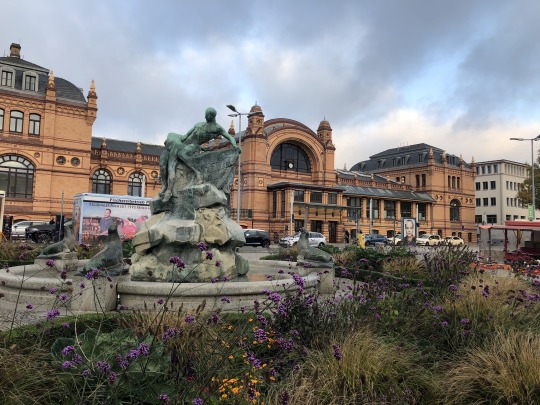
Wismar has been given World Heritage listing due to the fact that it has the largest preserved ancient town centre in the Baltic regional and is a memorial to medieval building techniques and lifestyle.
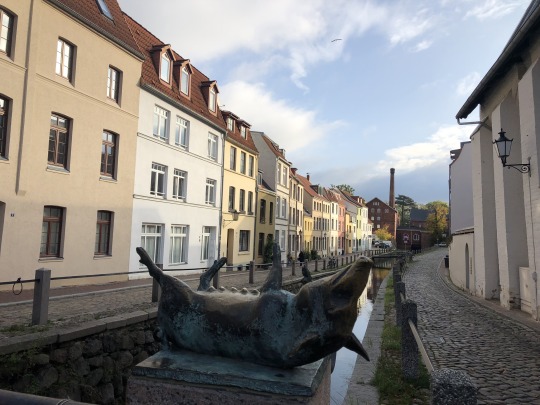
I loved these bottomless chairs being used for pots. Maybe something I could do on my new balcony.
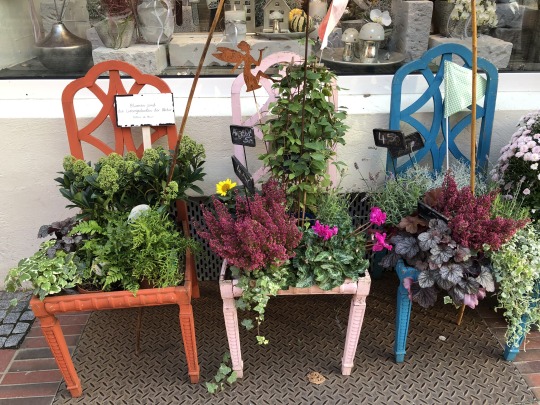
Many of the buildings throughout the town are original and show the wealth that came to Wismar from its importance in medieval times.
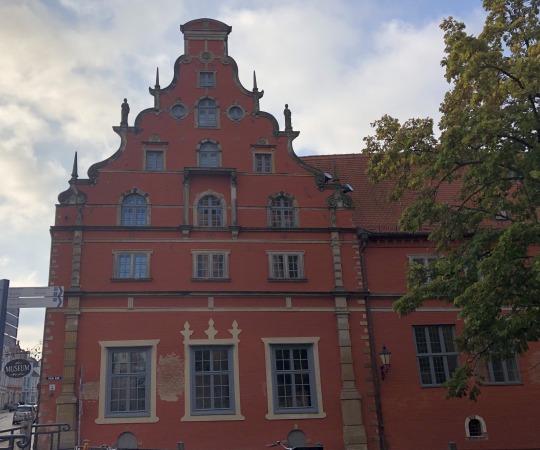
The 80m high tower of the Church of St Mary is a landmark of Wismar. The church was damaged in WWII and then demolished in 1960. Up until that time it was reputed to be one of the most beautiful brick churches in Northern Germany.
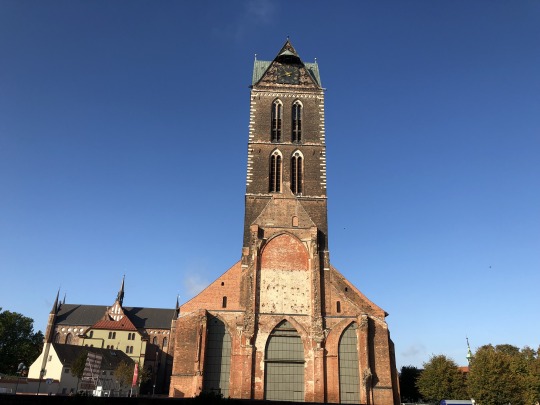
An old water wheel in the grounds of the church.
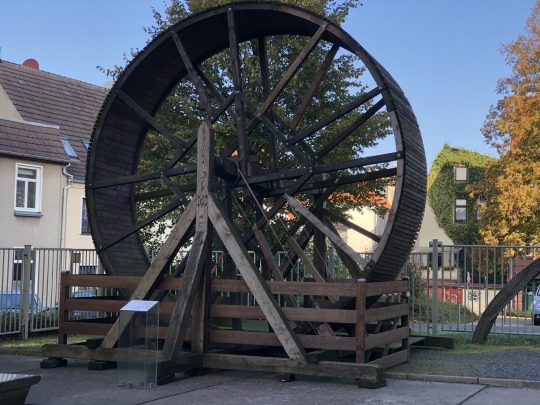
This pumping station in the market square was constructed between 1580 and 1602 following plans drawn up in the style of the Dutch Renaissance. It supplied the town with drinking water until 1897.
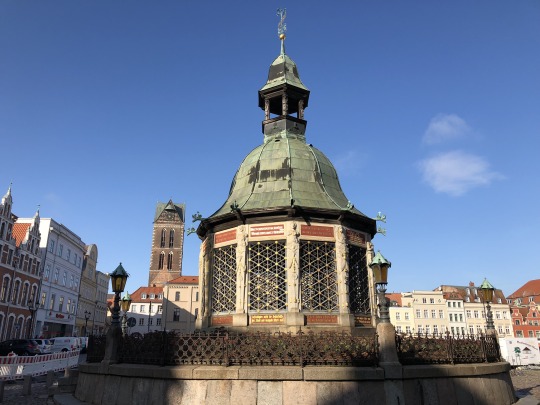
Around the Market Square were many attractive buildings.
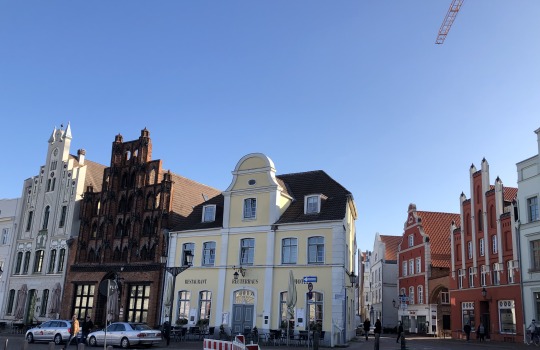
The brick building is known as the Alter Schwede, the Old Swede, and was built around 1830. In the Middle Ages there were residential and business premises on the ground floor and the first floor was used for stoarage. The building’s name was given in remembrance of Wismar’s Swedish period from 1648 to 1803.
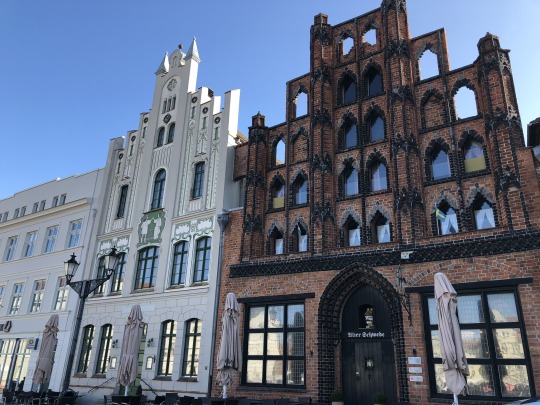
Wismar’s Market Square is one of the largest in Northern Germany. The town hall has been reconstructed in the classical style between 1817 and 1819.
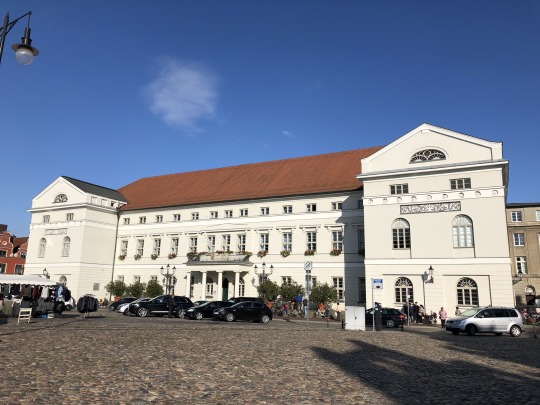
Kramer Strabe has many remarkable gabled houses which indicates its earlier and current role as a business boulevard.
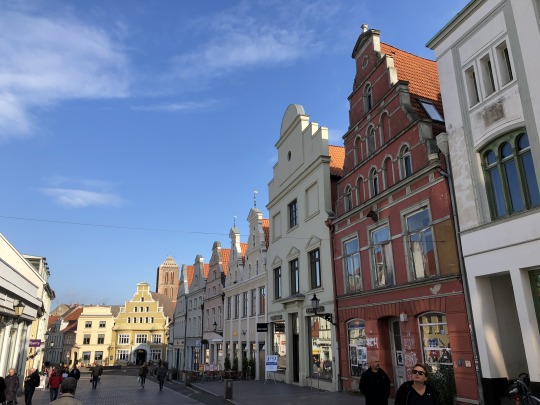
Out buildings surrounding the church complex.
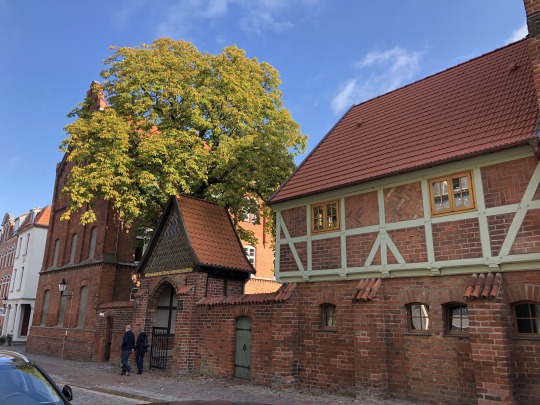
The Church of the Holy Spirit is a rectangular Gothic naveless church which came into being in its present form in the 15th Century. The interior is covered by a painted wooden ceiling.
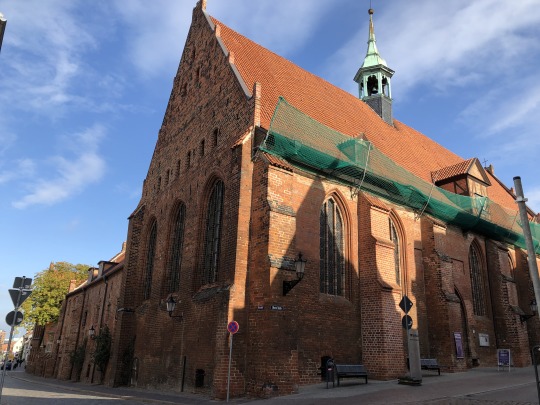
Another lovely street. Wismar has retained, virtually unaltered, the medieval layout to this day.
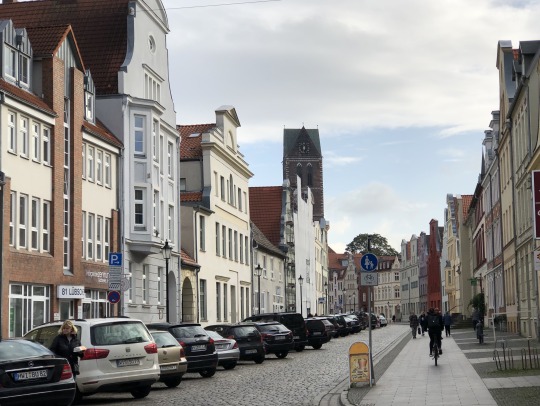
Buildings near the harbour. Much of Wismar’s wealth came from its access to a harbour.
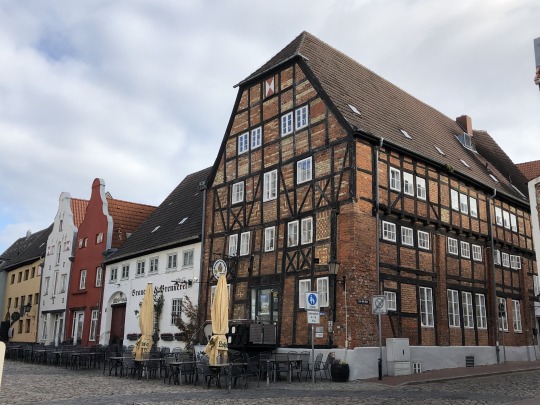
Lovely old building over the canal that runs through the town.
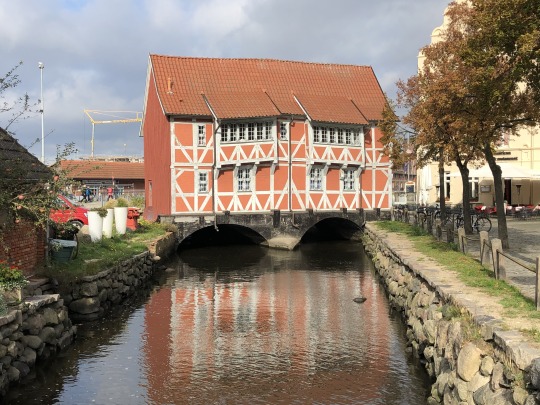
Old harbour.
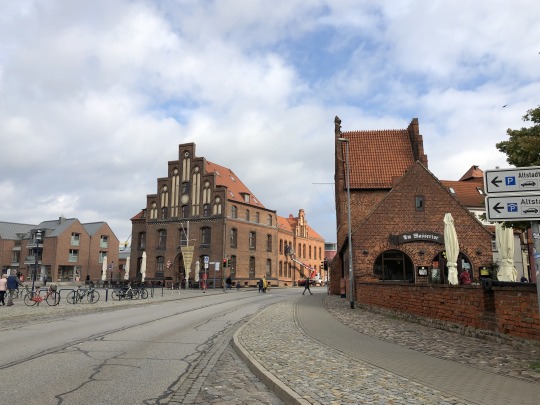
The Water Gate is the last of the five town gates which were incorporated into a 4m high town wall. The gate was erected around 1450 in the late Gothic style.
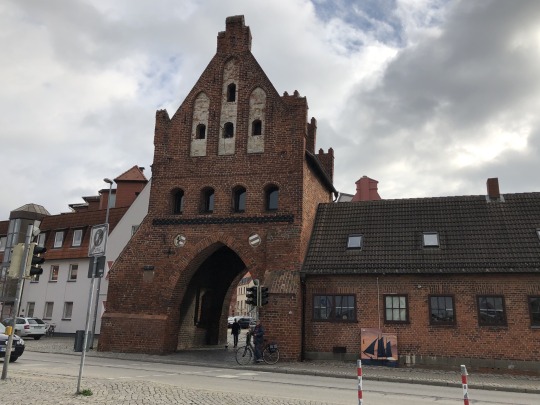
The street that runs from the Water Gate.
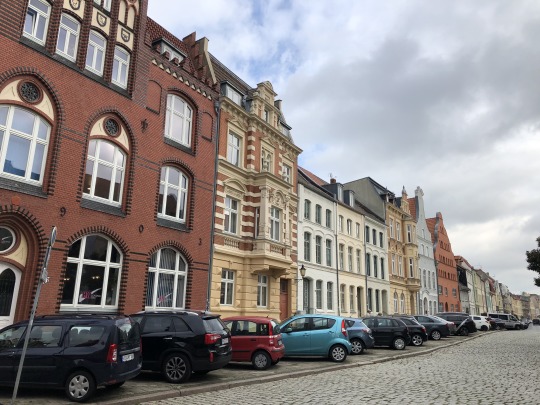
St Nikolai Kirche has a 37m high central nave and is the fourth largest church nave in Germany. Construction of the church began in the 14th Century.
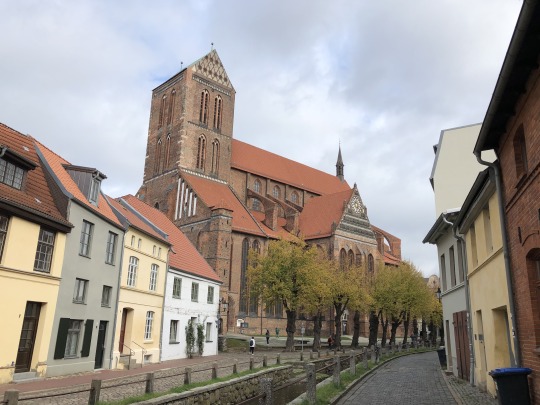
These brick churches are very impressive inside.
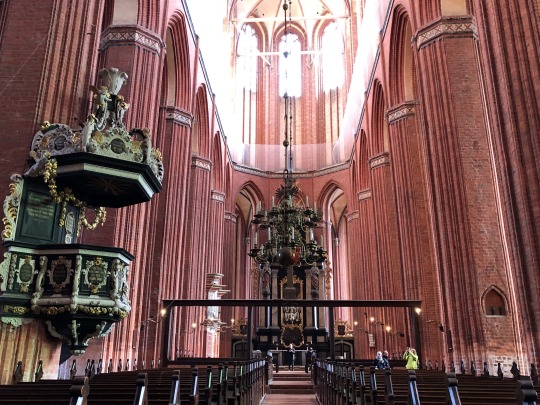
Very high and strong looking.
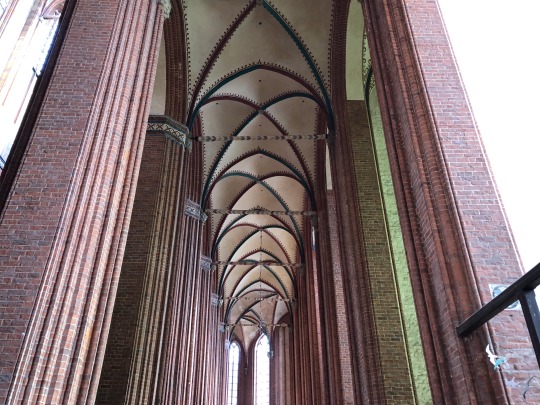
Guided statues of the bible story.
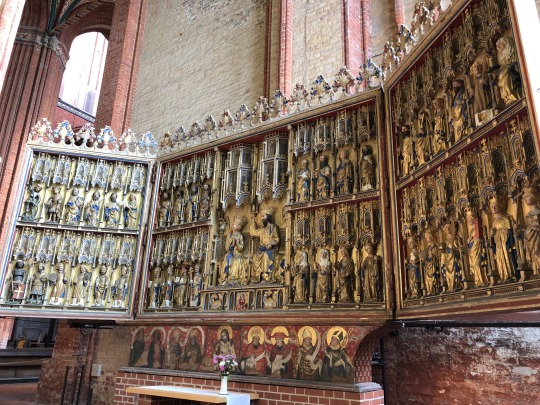
Patterned columns.
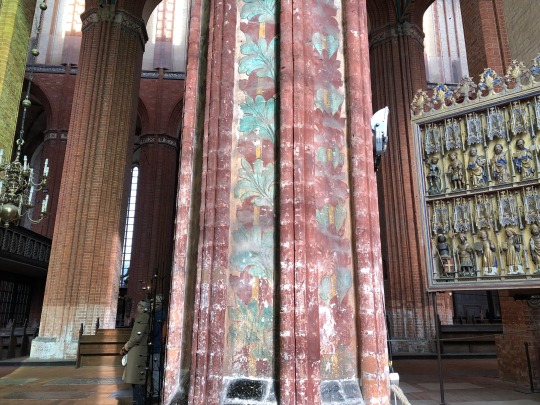
These churches are impressive buildings and to imagine they were built such a long time ago.
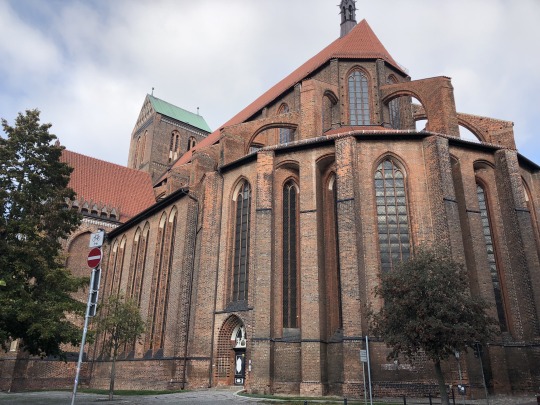
A treey walkway near the church.
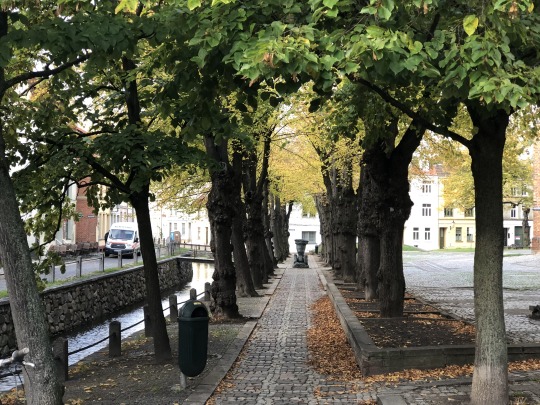
The sun had come out which made everything look brighter.
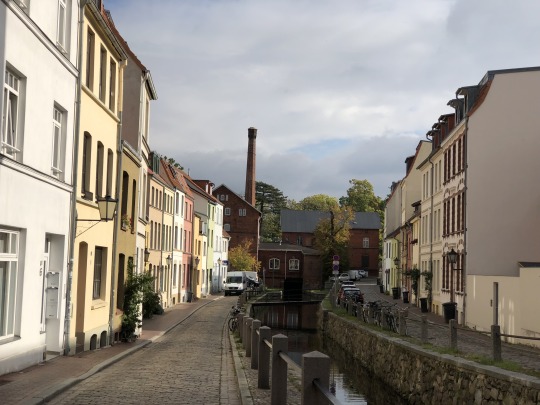
From Wismar I caught the train again and decided to continue on past Schwerin to Ludwigslust. I think the train just runs up and down between these three towns all day. I wanted to go to Ludwigslust as there was a substantially Schloss there. It was about a 20 minute walk from the train station to the Schloss.
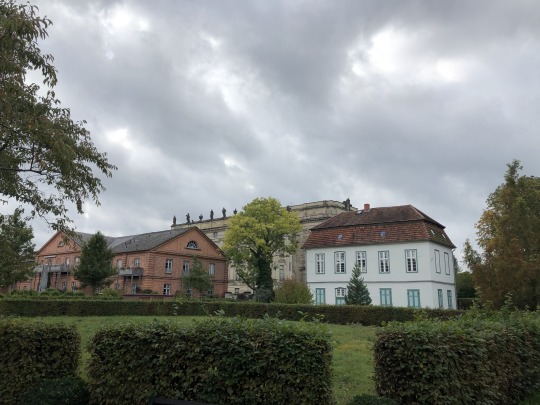
The Schloss from the garden side. The Schloss was originally built as a hunting lodge, rebuilt as a luxurious retreat from the ducal capital of Schwerin, then became for a time the centre of government in 1765-1837. The Schloss was the ‘joy’ of Prince Christian Ludwig, the heir of the Duke of Mecklenburg-Schwerin, hence the name Ludwigslust.
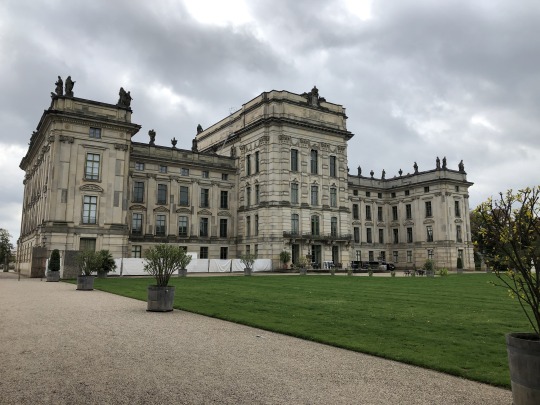
The water cascades from the front of the Schloss with the kirche in the background.
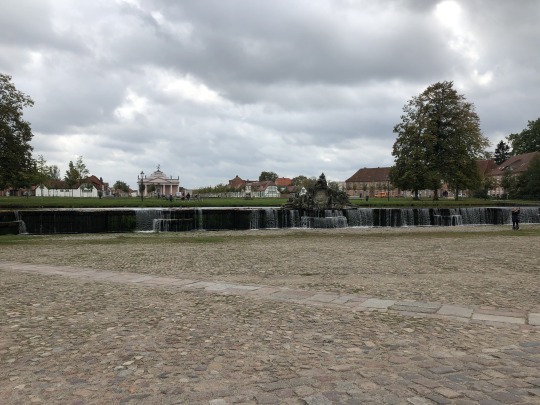
The Schloss kirche
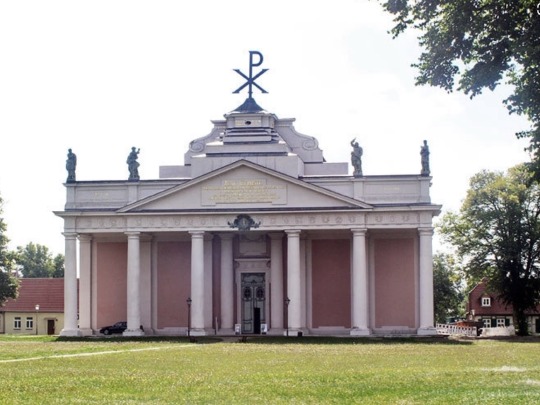
Inside the Schloss kirche
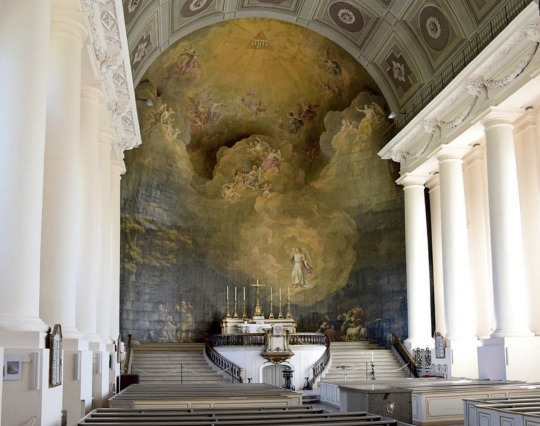
The front of the Schloss
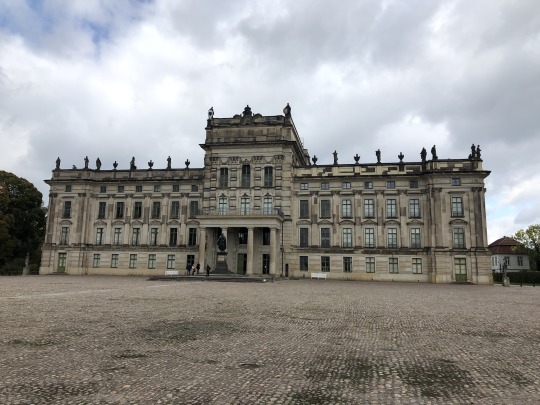
The cafe with a number of prized heads from hunting.
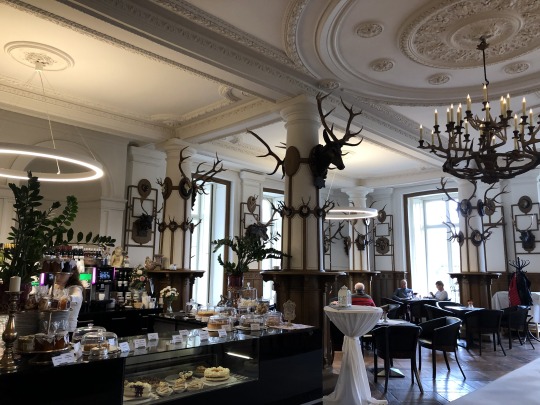
One of the main reception rooms. There were a few large paintings of animals throughout the Schloss.
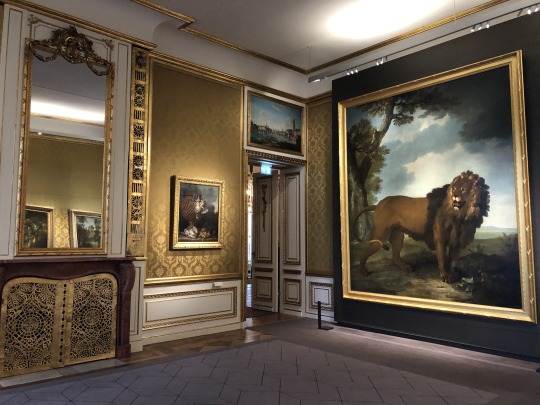
The Throne Room.
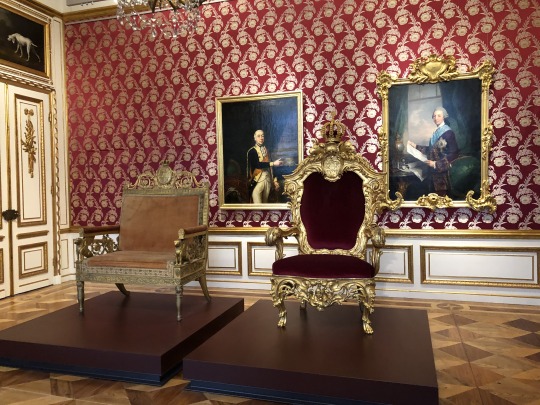
The painting gallery.
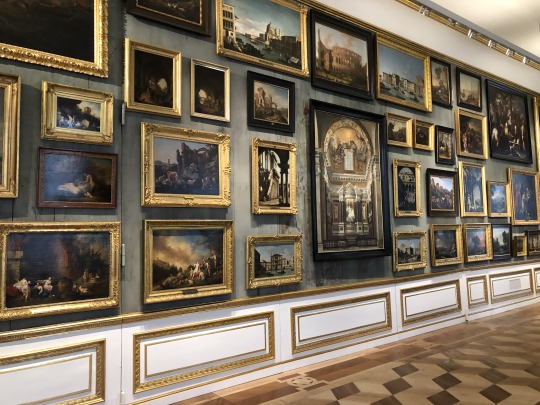
The chandelier, mirror and fireplace were all made of Meissen porcelain. Just exquisite.
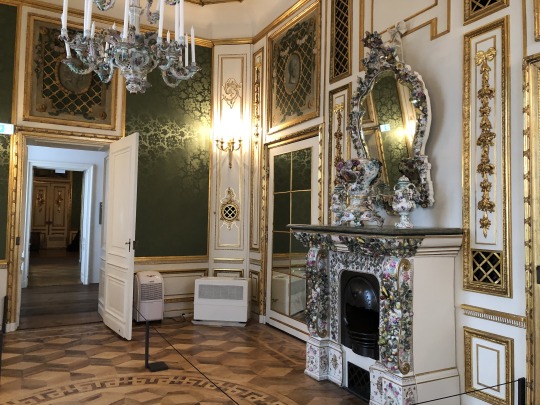
The beautiful chandeliers of the ballroom.
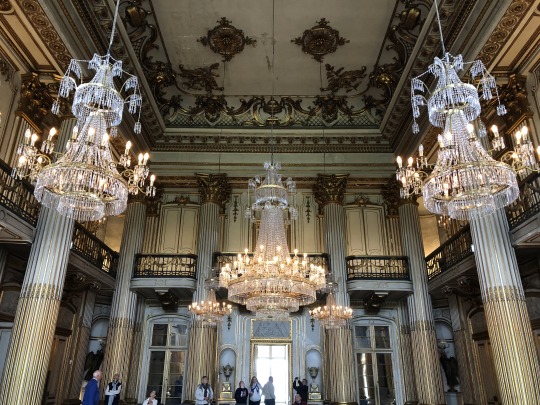
Me reflected in one of the ballroom mirrors.
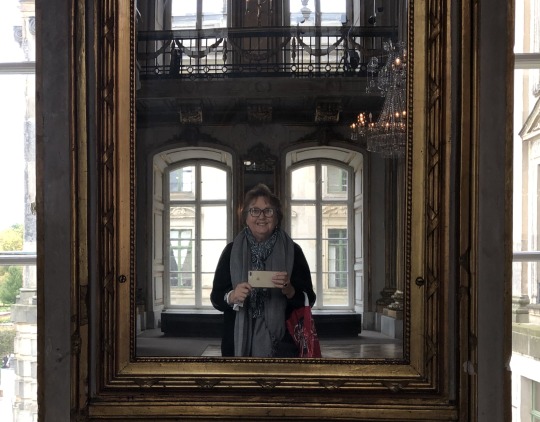
Lots of nice, decorative houses were all through the streets.
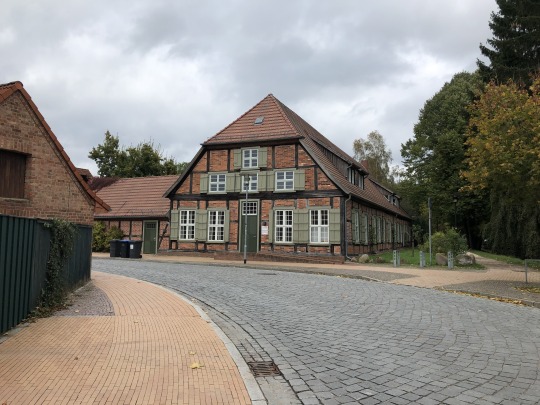
Very solid brick buildings are found in this area.
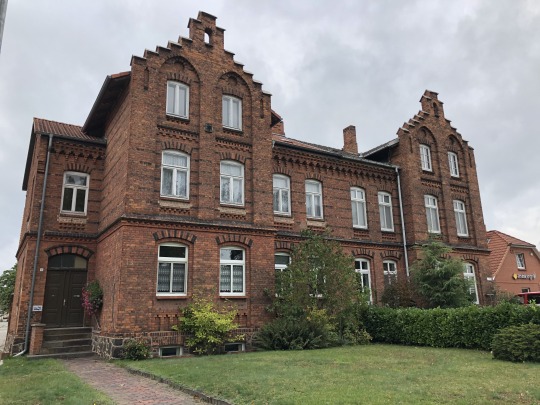
It was lovely walking back through the streets to the train station.
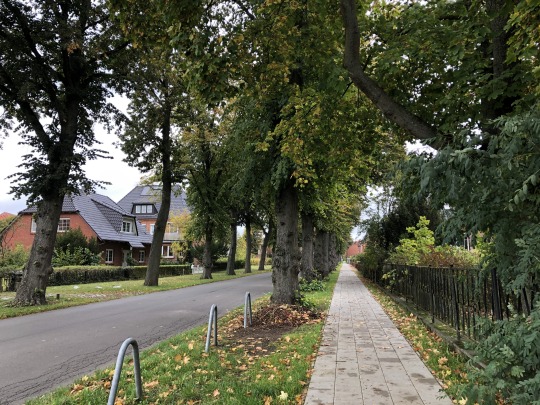
I caught the train back to Schwerin, collected my bags and then caught the train to Lubeck an hour away. I was staying in Lubeck for two nights so it didn’t matter that I got there late afternoon. I had had a very full day but it all worked out well. I got to see everything that I had planned.
6 notes
·
View notes
Text
Day 50, 9th Oct, Schwerin
Things didn’t go quite to plan this morning. I had the option of going start to Schwerin from Rostock or going via Wismar. I decided to go via Wismar. Either way was only an hour. I was under the impression that the Wismar station had Left Luggage lockers so I could have a look around Wismar and then go on to Schwerin which was half an hour away. Unfortunately the train station was having major renovations done and there weren’t any lockers. That was fine but I didn’t realise the other train in the station was the one I should have taken to Schwerin, if was only a small station. I missed it by a whisker when I realised so had to wait another hour. My planning for this trip has gone like clockwork so one little hitch doesn’t really matter. It was overcast and a bit wet so seeing Wismar today wouldn’t have been that pleasant, anyway. I got to Schwerin, checked in early to my hotel and then headed out. I wanted to come to Schwerin as there was a palace here of some significance. In the town a lake had been made in the middle by daming an area. The Der Pfaffenteich. Surrounding the lake were nice looking buildings.
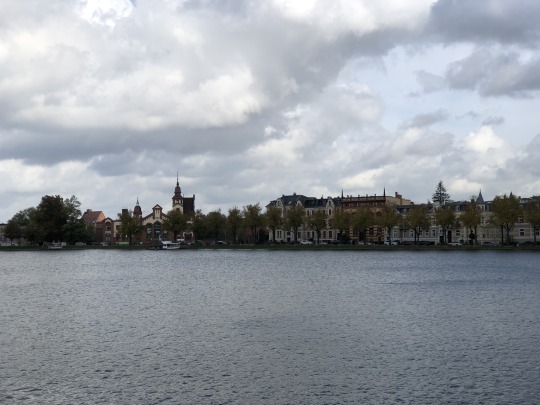
The Dom can be seen in the distance. It was still a bit overcast in Schwerin but I could see that the sun was trying to come out.
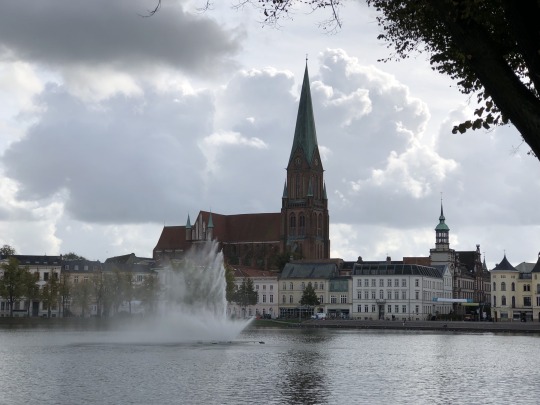
Most European cities have some pedestrian streets with little courtyards and narrow streets off them.. This courtyard caught my eye and had a couple of different craft shops in there.
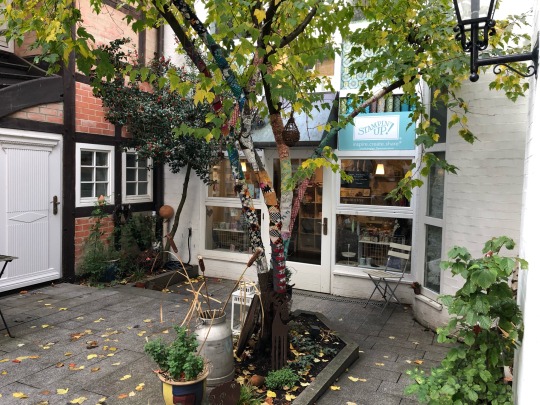
The steeple of the Dom and the sun was out. It really makes a difference and brightens up everything.
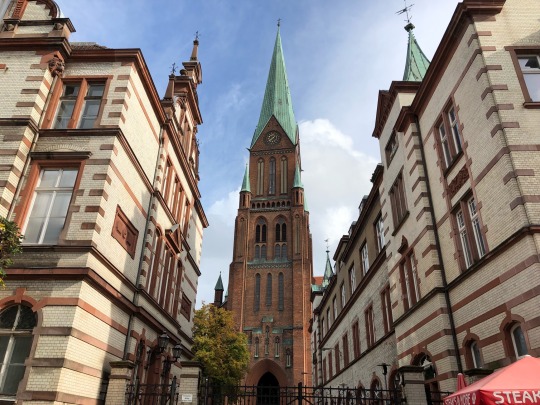
Narrow lane way.
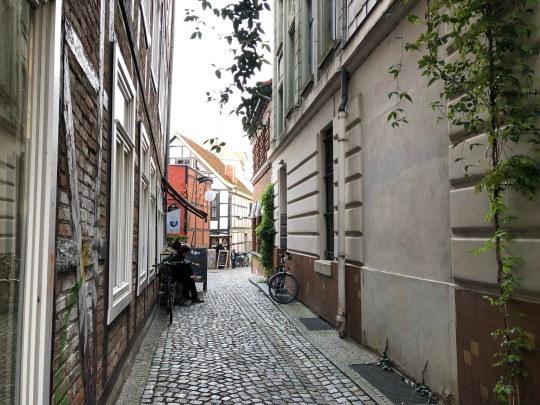
Schwerin castle is prominent when you walk down the Main Street. It is built on an island so you approach it across a bridge.
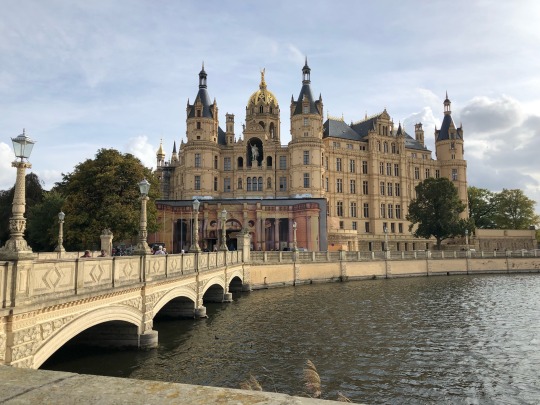
The Museum and Theatre were both significant looking buildings close to the castle.
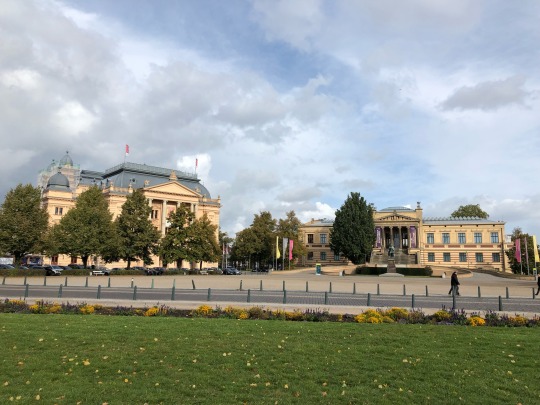
The Theatre was very impressive looking for a small town so you can see the significance of being close to the castle.
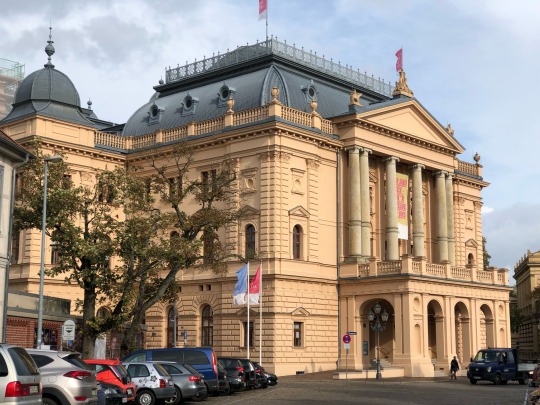
Horse statues on the bridge.
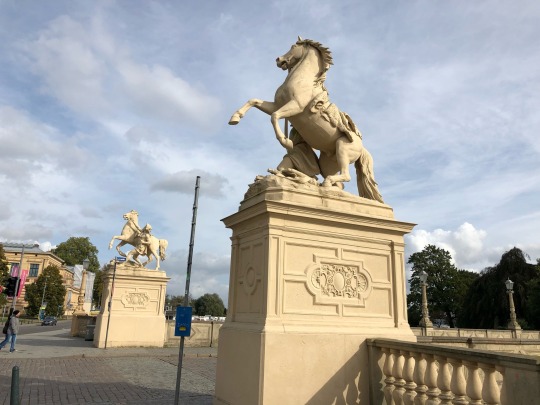
The magnificent residence was built in the mid 19th century as a renovation and extension of the original palace structure which had existed there for over 1000 years since Slavic times. It was built by Grand Duke Friedrich Franz 11 of Mecklenburg-Schwerin. This was looking into the inner courtyard.
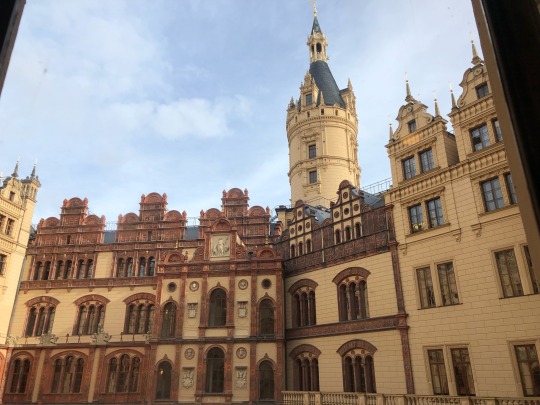
The decorations are neo classical and many of the rooms have been restored.

You can visit the State Rooms as well as the private apartments of the Grand Duke and his wife.
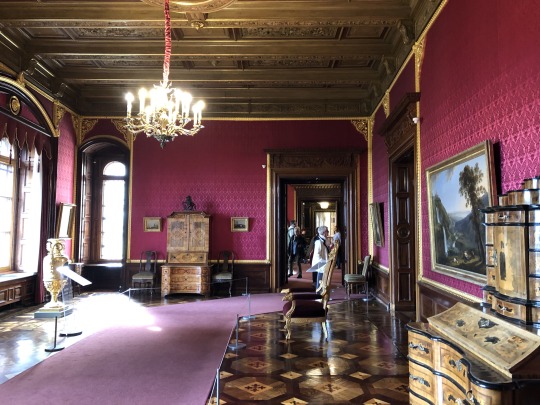
The parquetry floor is very beautiful.
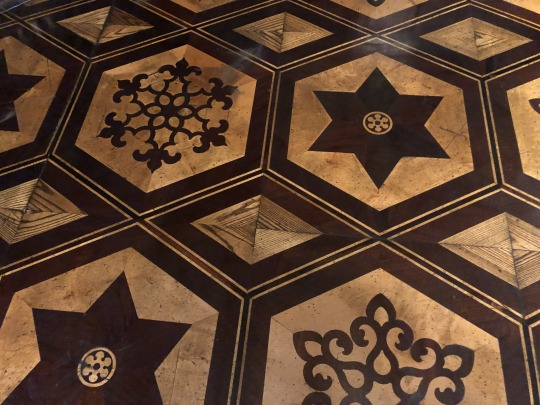
The round rooms look out onto the garden and lake.

This was the family’s dining room. The wallpapers are relics of the originals.
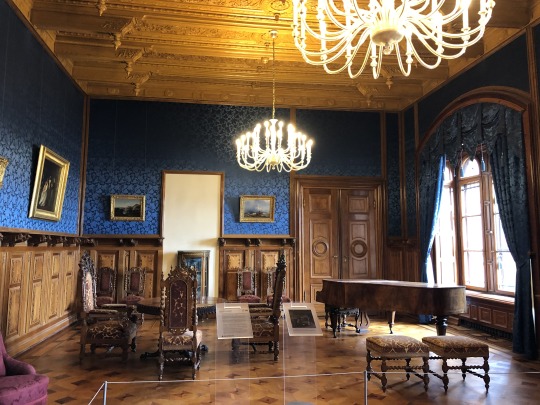
Another view of the inner courtyard.
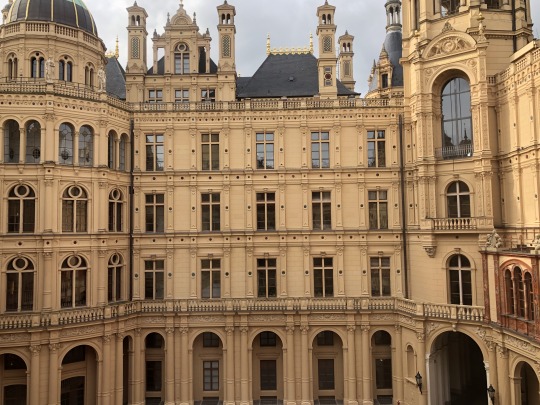
Looking out to the garden
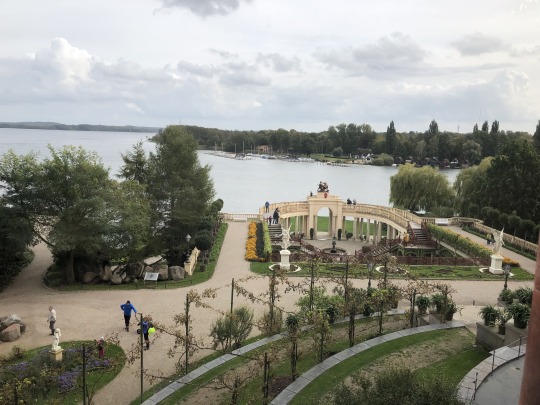
The ornate Throne Room was very imposing and it was the centre of political representation.
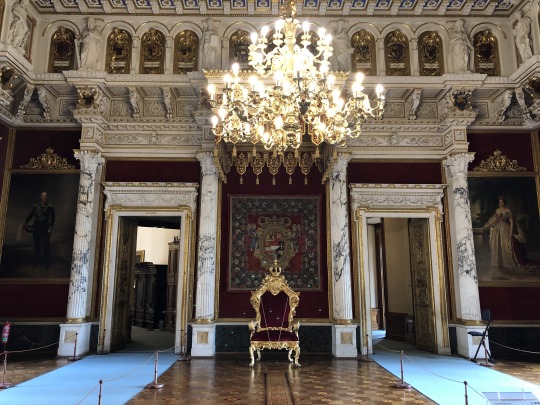
The ceiling of the Throne Room.
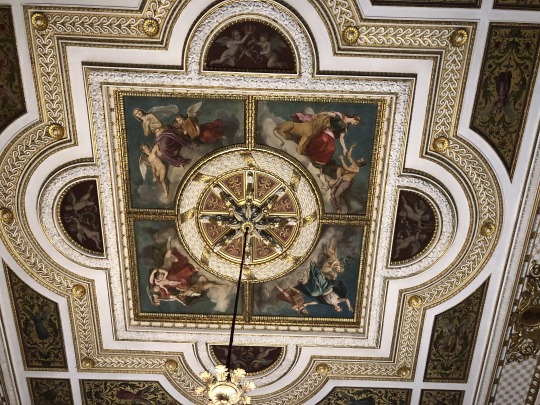
Before visitors would have entered the Throne Room they would have walked through the ancestral portrait gallery featuring images of the Dukes of Mecklenburg-Schwerin from the 14th to the 18th Century. They were a continuous ruling family.
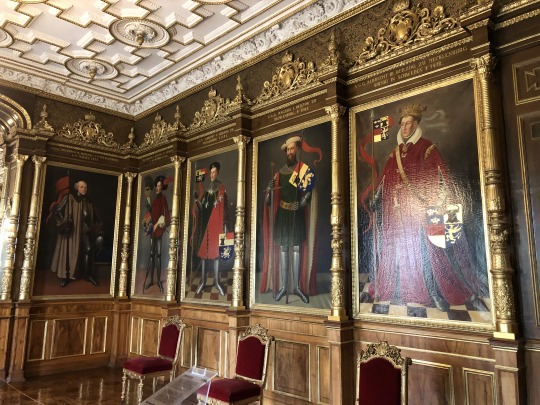
The first Duke’s portrait is next to the Throne Room entrance.
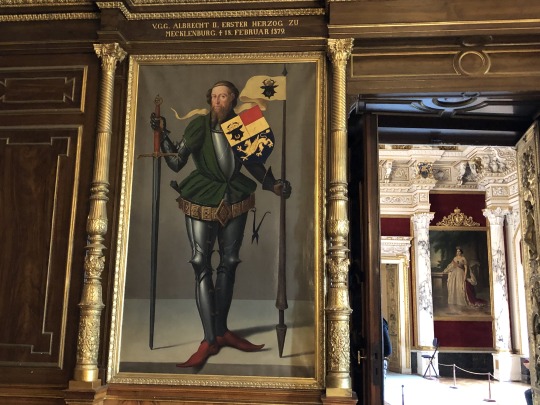
Downstairs was the Armoury which had a church like feel and a big display of weaponry.
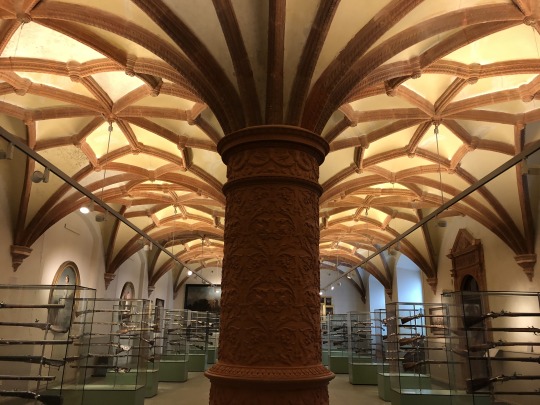
The three part windows of the Armoury were adorned with 18 full figured portraits of Mecklenburg princes. It easily show the historical importance of the family.
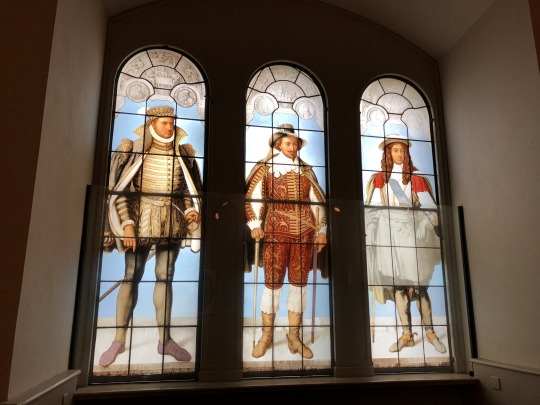
Outside is the Orangery which has a colonnaded courtyard.
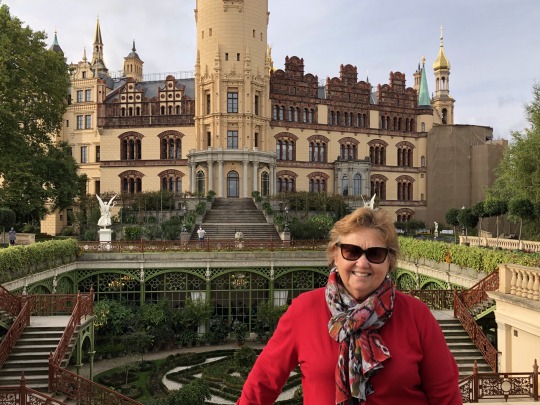
Close to the palace were lovely gardens and statues.
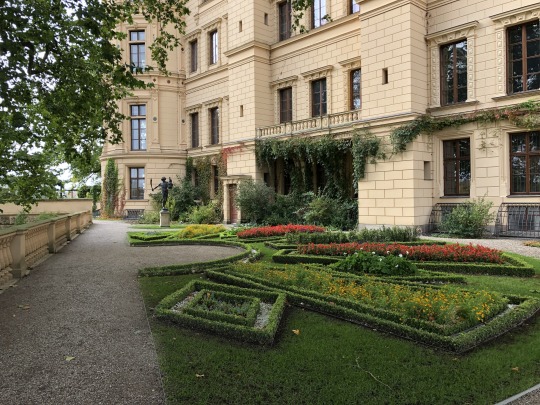
Looking down on one garden.
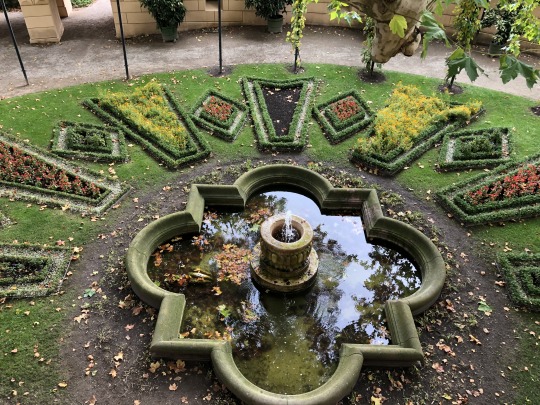
Also attached to the island is a significantly sized garden with long vistas.
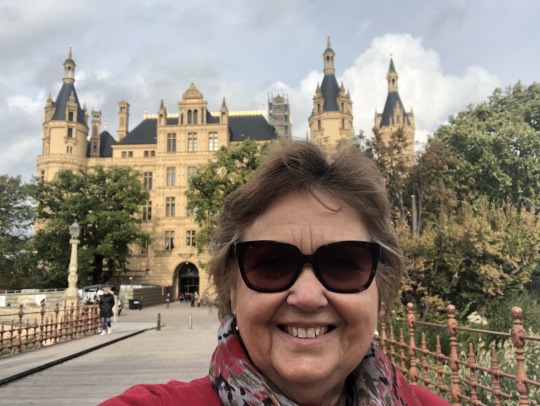
A statue of the Duke riding his horse in the grounds of the garden.
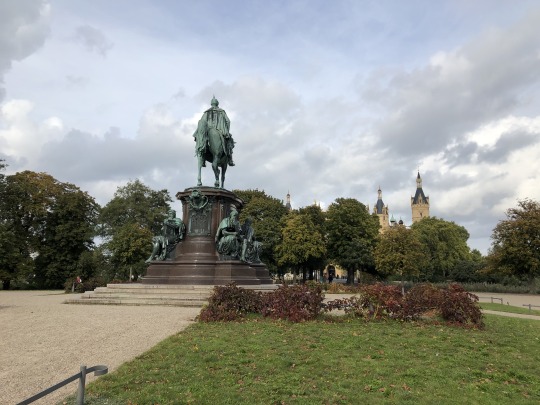
After visiting the palace I enjoyed just wandering around the town, stopped for some afternoon tea and had a bit of a look at the shops. If I want to buy anything if has to be before I get to Norway as it’s far too expensive to shop there. I did pick up a couple of things.
2 notes
·
View notes
Text
Day 49, 8th Oct, Rostock
On the move again. This time by train to Rostock which is up on the north coast of Germany. I haven’t been in this part of Germany before so I thought it was a good chance to explore this area. It was pretty grey and a bit wet as I left Berlin and it only got worse as I travelled north. Blue skies and sunshine make such a difference. Once I dropped my bags I headed back to the station to catch the S Bahn to Warnemunde, a resort town, at the entrance to the port of Rostock. Luckily everywhere I have stayed have let me into my room early but I’m happy if I can just drop my bags as I’m usually straight out the door.

Warnemunde was a surprise. There were only a few locals on the train which only takes about ten minutes from the centre of Rostock and it didn’t look like much when I first arrived but around the corner there were people all over and lots of colour. It is a fishing port as well as a resort town with pleasure boats and tourist boats catering for the holiday makers. The port is also important for Germany’s economy.

The style of the buildings were very unique to this area. I enjoyed a bit of a look in the shops. I nearly bought a rain coat which I thought might be handy in my van.

Big ferry ships between countries come into this port as well. A Swedish one was leaving in the distance. The port is also connected to Denmark by ferry.

It’s school holidays so there were a lot of families around.

The entrance to the harbour has one red and one green lighthouse on the breakwaters.

A sailing race started as I was walking along the breakwater. They were really travelling as there was a bit of a wind behind them.

The beach was popular and the sand looked almost as good as you find on our beaches. A few kites were flying.

Beach chairs packed up for winter. Further along the beach were big hotels and more beach chairs.

This lighthouse was built in 1897 to 1898.

Away from the beach were lovely streets filled with quaint houses.

Many of the houses were hotels or apartments for rent.

The bright colours brightened up a dull day.

Back in Rostock which proved to be another interesting city. Rostock is the largest city in the German Federal state of Mecklenburg-Western Pomerania. Rostock was the largest coastal and most important port city in East Germany. The port of Rostock is still the fourth largest port in Germany and the largest port on the German Baltic coast.
Part of the original city walls still exist and the Stainton is one of the gates that still remain.

St Mary’s Church Marienkirche is an imposing Brick Gothic church. It was built in the 13th Century. The huge tower was only completed at the end of the 18th Century.

The Neuer Markt which started in the 13th Century is surrounded by original, carefully restored gable houses from the 15th and 16th centuries. Some historical houses in the Hanseatic style were destroyed in an Allied air raid in 1942.

The Rats Apotheke is an original pharmacy operating in this one location for centuries.

The Rathaus is as old as the Neuer Markt but doesn’t look it as in the 18th Century the facade was damaged in a storm and was replaced with a new Baroque design. You can still see the set of seven Gothic turrets capping the roof from the 13th Century.

Most unique shaped buildings are original which makes them more amazing. They are scattered in among newer buildings.

The Kropoliner Tof. Rostock’s defensive walls were first built in the 1100′s and then added to in the 16th and 17th centuries. Only four of the original twenty medieval gates remain.

The main pedestrian area.

All over the Old Town are great examples of Hanseatic style of architecture.

The university building is at the end of the main shopping area. The Rostock University was founded in 1419.

This house was typical of the houses near my hotel which was in a similar style. My room was up in the ceiling. Luckily the girl carried my bag up.

The weather wasn’t the best today but I got to see a bit of both of these towns and managed to avoid the rain and even had a few glimpses of sunshine.
4 notes
·
View notes
Text
Day 48, 7th Oct, Berlin
This morning I caught a bus around the corner from my hotel. I buy a day card each day, which costs about €7, and it lets you travel on any form of transport all over the city, so great value. Bus 265 took me to where I was going. This bus continues on to Tempelhof Park which is where the huge impressive Russian Memorial is located but I didn’t have time to revisit that today. On the street I came across some more ‘stumbling stones’. These people died in Auschwitz and Chelmno.
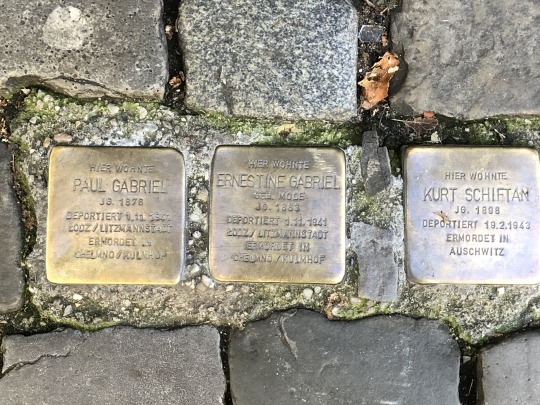
This was the building the stones were in front of. The stones are a real reminder of what happened on this spot during the war.
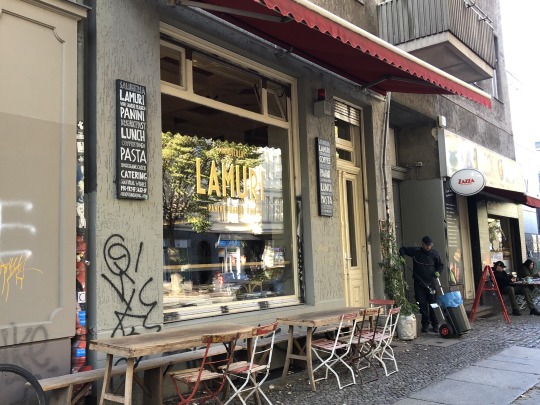
I was in this location as I wanted to see this particular street art painted by the identical Brazilian twins Otavio and Gustavo Pandolfo who are best known for their large-scale installations and murals depicting strangely dressed and unusually proportioned, yellow-skinned figures. Influenced primarily by their upbringing in São Paolo, they first started developing their recognizable style at the age of twelve. I have now seen their work in Łódź, Vilnius, Lisbon, Vancouver and now Berlin.
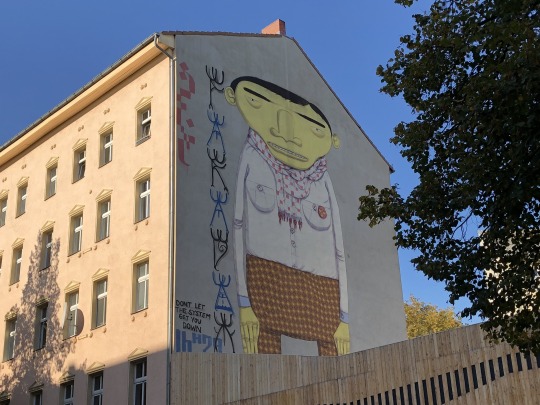
The U Bahn also rans through this area up on raised lines. I was on my way to the East Side Gallery across the river after seeing the painting.
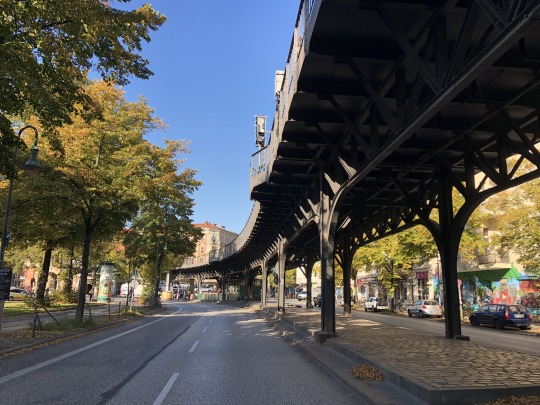
The Oberbeurn Bridge which is considered one of the most attractive bridges in Germany. The towers were badly damaged in the war. The bridge was one of the dividing lines between east and west. The bridge in East territory.
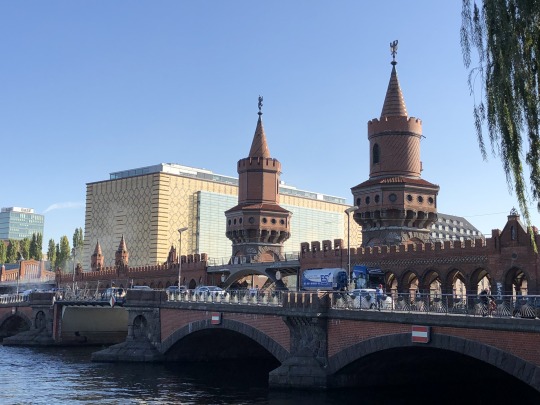
The river was in East Berlin, as well.
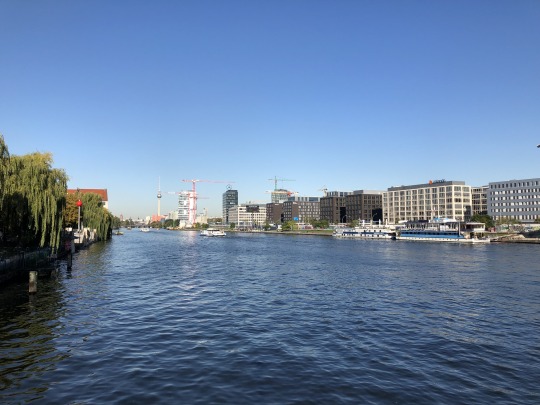
The East West Gallery runs along the river in this area. The birth of Berlin’s street art scene can be traced back to 1961 when the Soviet Union erected the Berlin wall, separating East Germany from West Germany. Due to the symbolic significance of the wall as a divisive medium, it became the obvious place for the citizens of Berlin to express their opinions and frustrations on a whole range of issues. On the other hand, it was also seen as an exceptionally unattractive eyesore that the people of Berlin felt compelled to do something about. During the Cold War, the West side of the Berlin wall was completely covered in painting, unlike the East side of the wall which remained blank, because people in East Berlin were unable to get close enough to the wall to paint on it. Interestingly, since the wall fell in 1989, a lot of new art was added to the East side of wall in the 1990’s, allowing viewers to trace the historical and political change that occurred in Europe by comparing and contrasting the different themes depicted on either side of the wall.
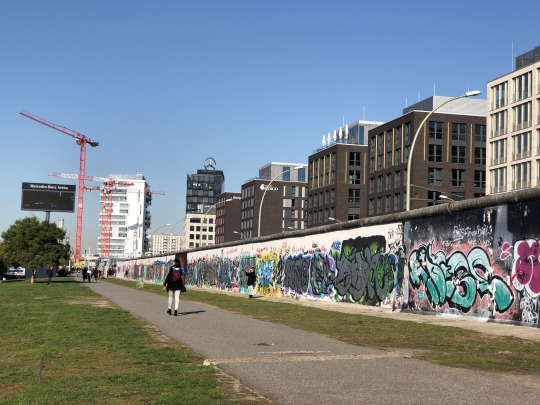
The paintings seemed a bit different to when I was here before. I know there has been some work done to preserve the almost 30 year old paintings in some cases but there looked to be new ones and not all about the wall.
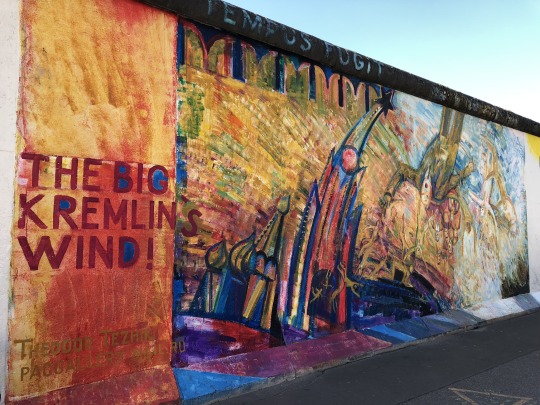
This one is probably the most iconic. It has definitely been given a facelift. It’s of Breszhnev kissing Honecker.
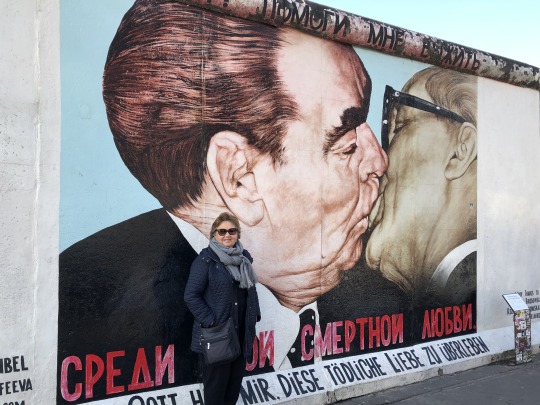
Some that I remembered from last time were a bit hard to see as there was a new building going up and boards were in place along part of the wall.
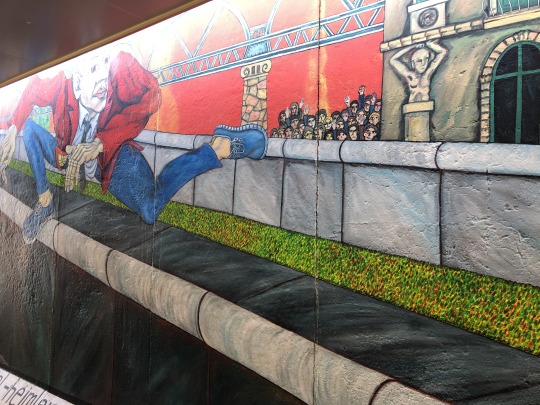
Mercedes Benz dominates the city a bit. The company brings in a lot of money as well as owning a lot if real estate. The areana is across the road from the Gallery.
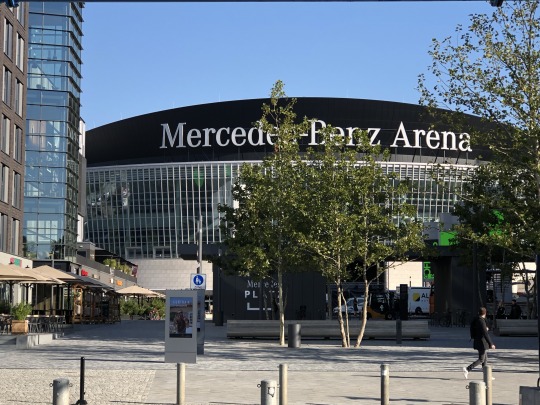
New work like this one was about Amestry International.
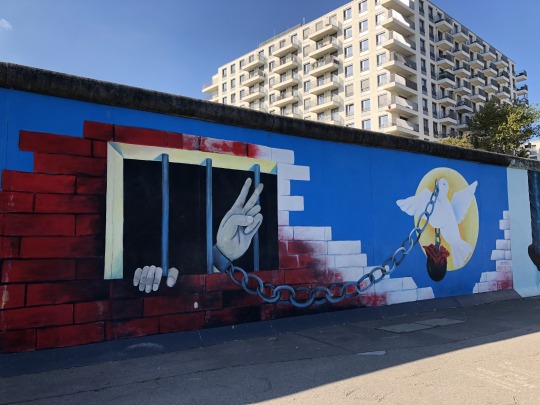
From the Gallery I caught a U Bahn then the No. 100 bus that goes from Alexander Platz up the main strip to the Brandenburg Gate. The statues on the River Spree.
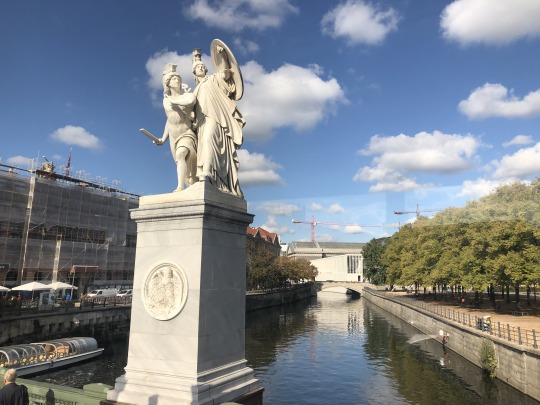
One of the Museums in this area.
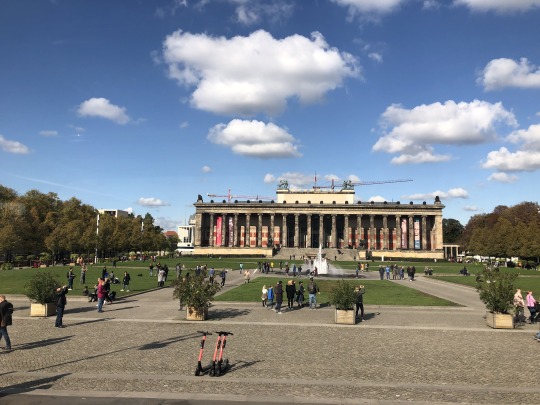
The Dom.
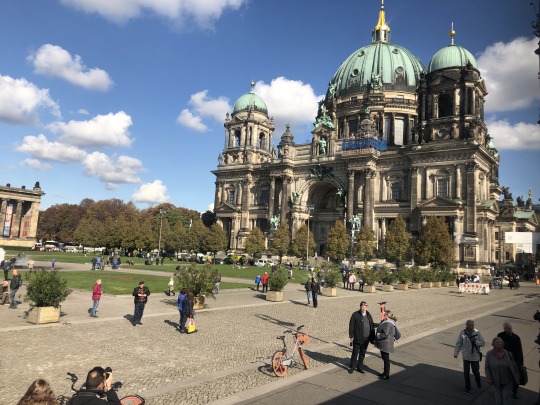
The University.
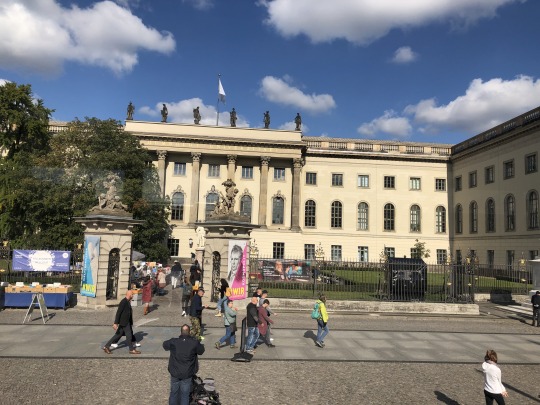
The Brandenburg Gate.
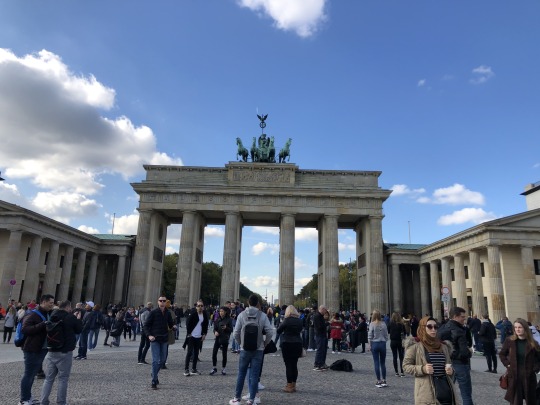
Very close to the Brandenburg Gate is the Jewish Memorial.
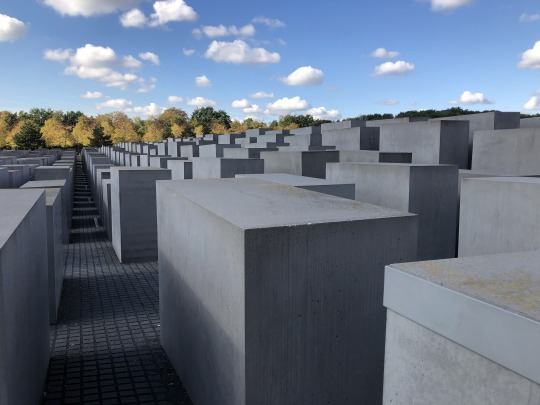
It’s just all grey blocks of different heights and sizes on undulating land. Very unique.
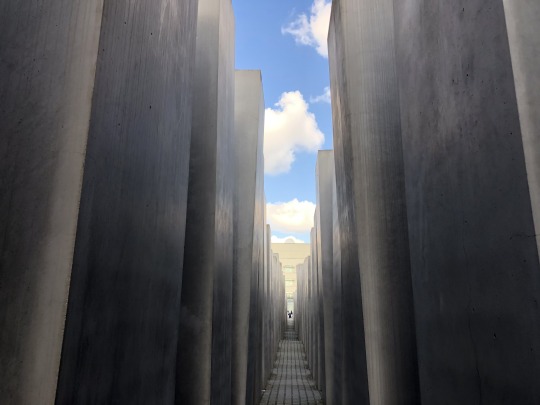
From the Memorial I walked to the Sony Centre at Potsdam Platz. I had never seen it close up.
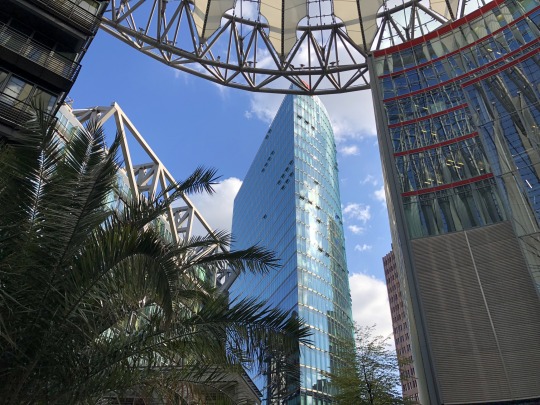
Quite spectacular the space inside.
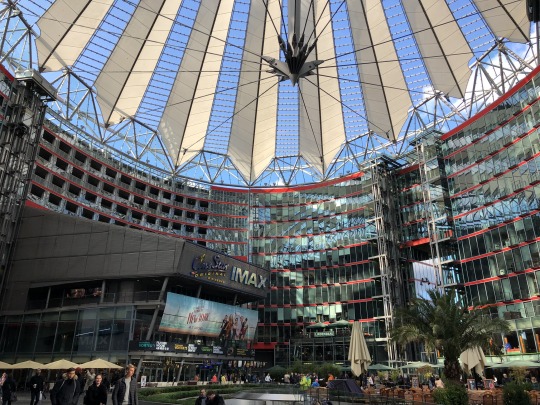
The roof is amazing. I spent a bit of time in here.
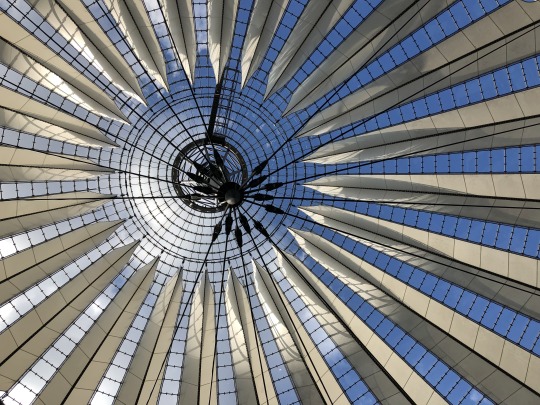
Back on the streets a climate change demonstration was going on. All very peaceful.
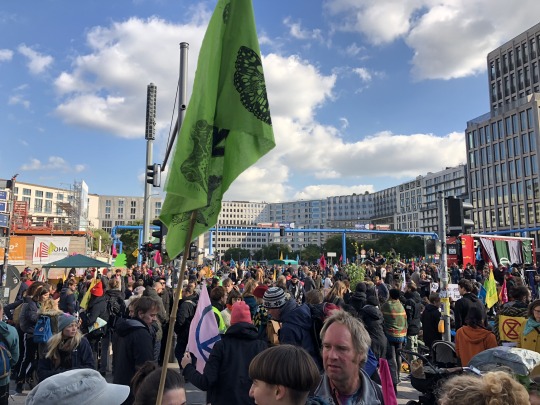
Mostly young people there with a big police presence.
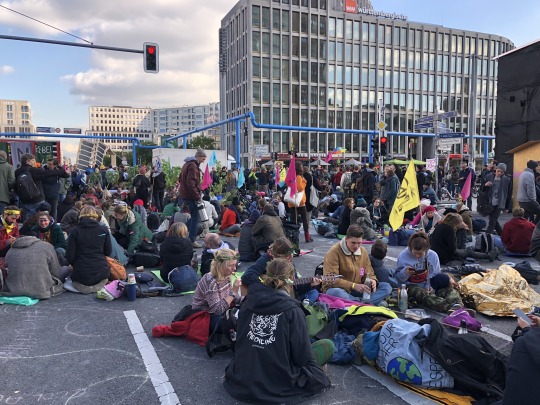
All over Berlin you come across information boards about some historical event in the past. The Germans don’t hide their history.
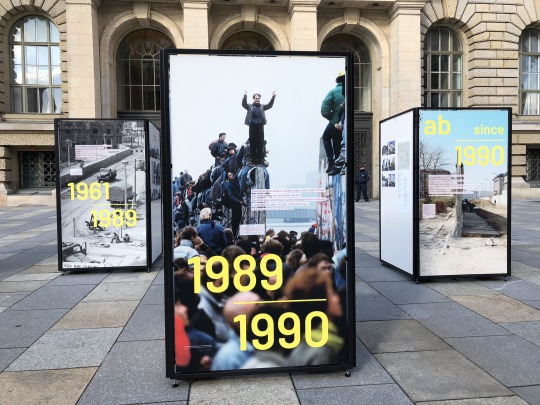
These cars where used extensively in East Berlin and are now a novelty. You can hire them for a ride around the city.
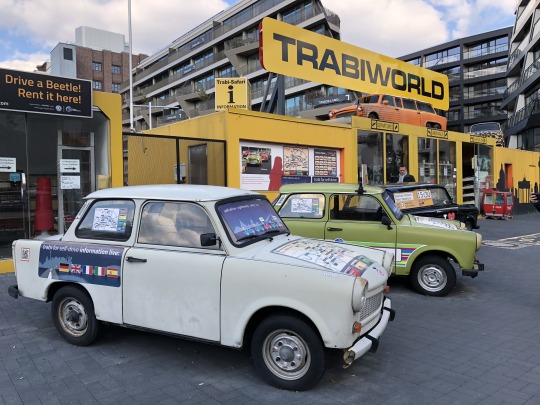
This is part of the wall at the Topography of Terror.
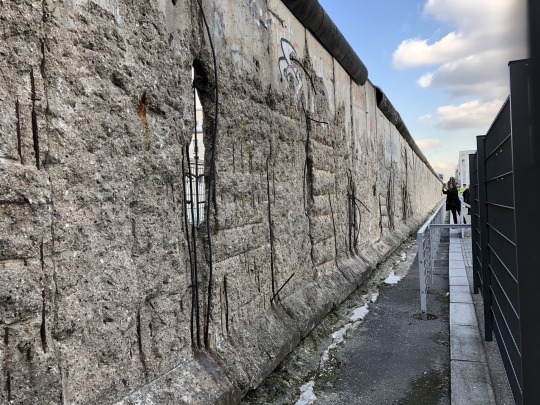
The ballon was taking people up high for a birds eye view.
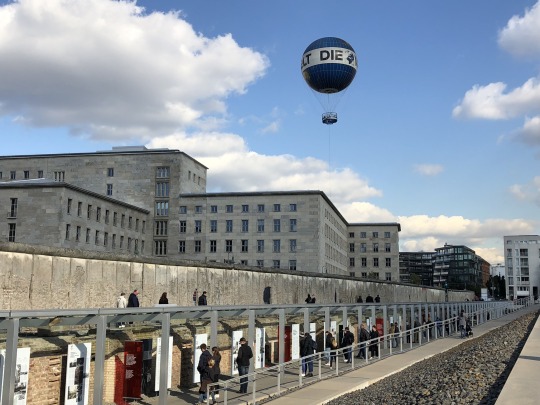
Wherever the Wall was in Berlin it is now indicated by stone work and bronze plaques.
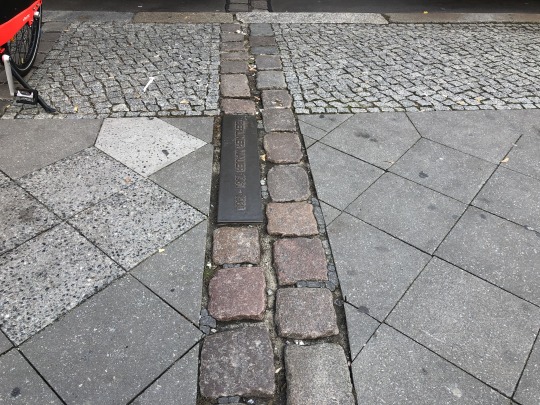
Checkpoint Charlie.
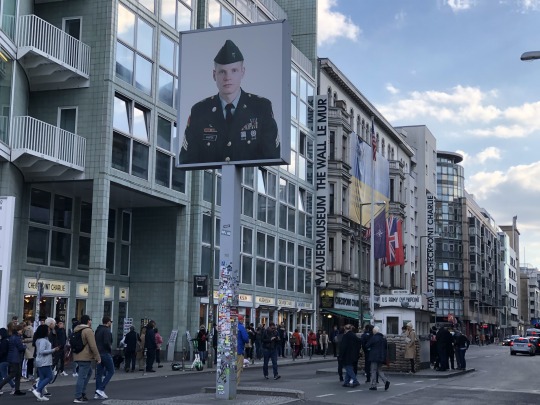
I took the opportunity to have my photo taken. Usually there are people dressed in Us and Russian uniforms you pay to have your photo with. Maybe they have stopped that.
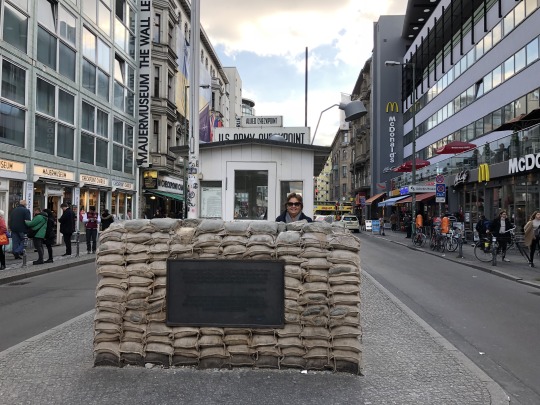
This is the way it looked in the day. A very tense location.
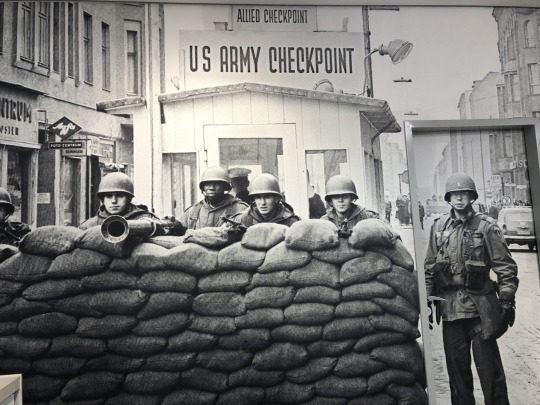
The sign at Checkpoint Charlie.
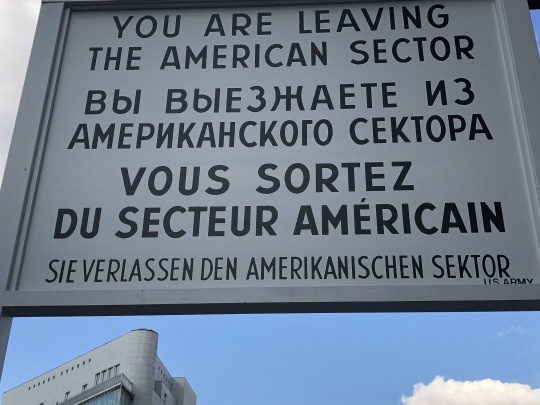
This girl had an interesting tale. I came across her putting down a row of dirt and a row of seeds. It symbolises the joining together and growth that comes when things combine. Eg seeds and dirt. She is an artist and tries to do 9 each day. I can’t remember how many she wants to do all up but it’s between her parents home and the refugee camp they were in when they arrived in Berlin from Russia. She was 9 when they came in 1995. She told all about her family and that she doesn’t know whether she feels a Russian or German. A common issue for many new migrants. It’s amazing what you come across walking the streets.
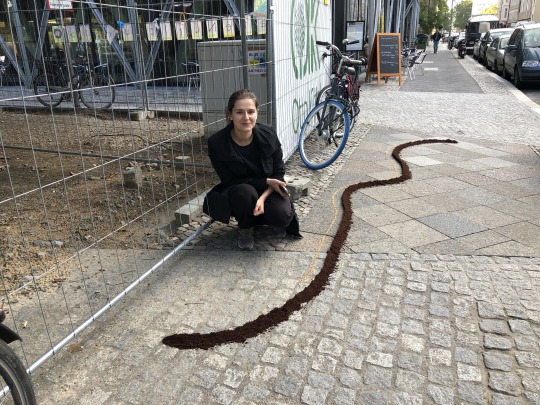
I finally made it to the Jewish Museum. I have never been there before. The front of the Museum is very different from the newer building that houses most of the exhibits.
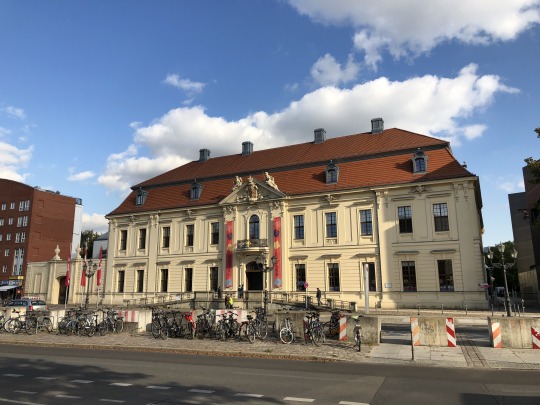
The Halocaust Tower.
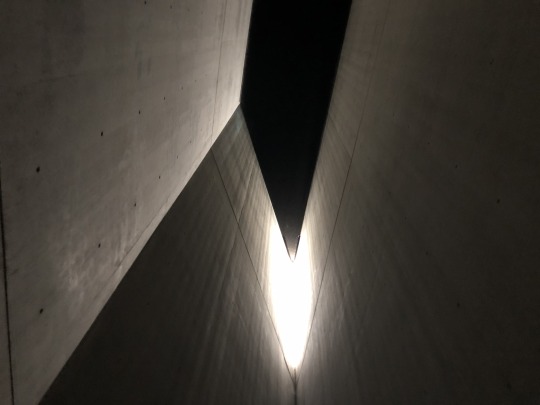
Slanting walls, sharp angles, gaping voids. The architecture creates its own symbolic language for the history of the Jews in Germany. The Axis of the Halocaust and The Axis of Exile portray the persecution and murder of Jews during the Nazi era, as well as the escape from Germany into exile.
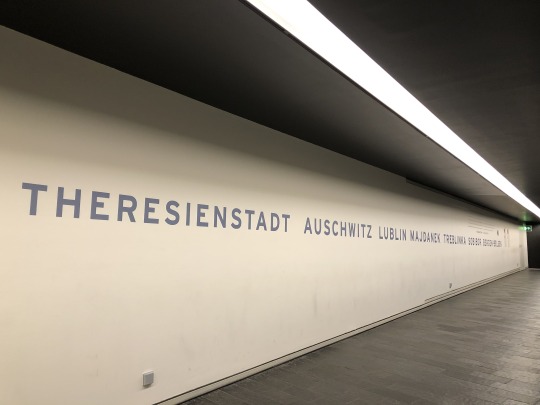
The Garden of Exile is made up of 49 concrete slabs positioned on sloping ground. The trees growing on top are a symbol of hope.
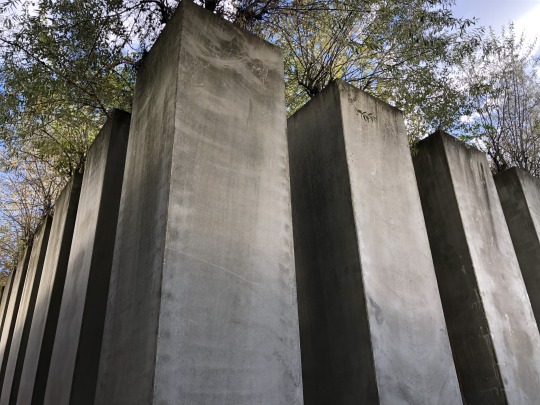
The Memory Void is dedicated to the victims of war. 10,000 heavy iron plates are cut to resemble faces. You can walk on the faces and they give off a clanging sound which is a bit chilling.
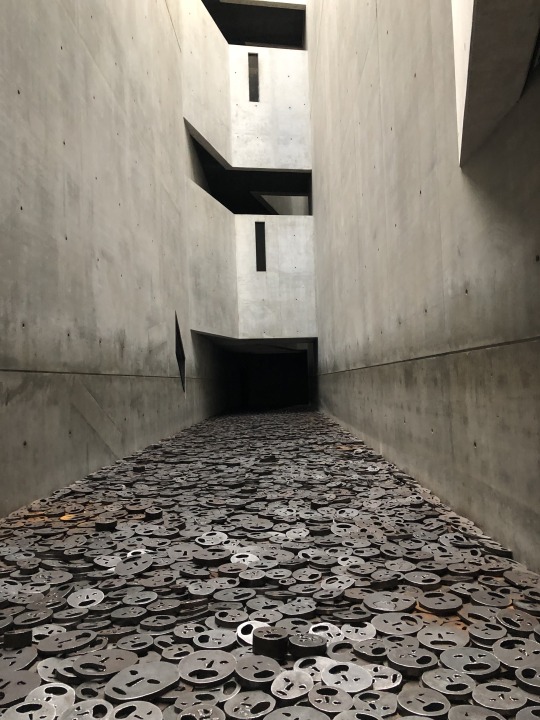
The grey futuristic look of the new building which houses most of the museum.
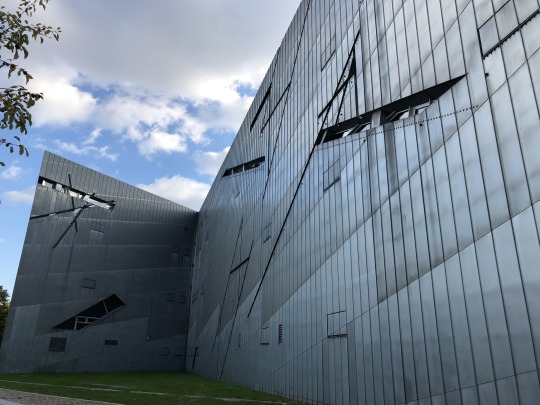
A lighter exhibition of photographs from the West Bank of Isreal was also in the museum.
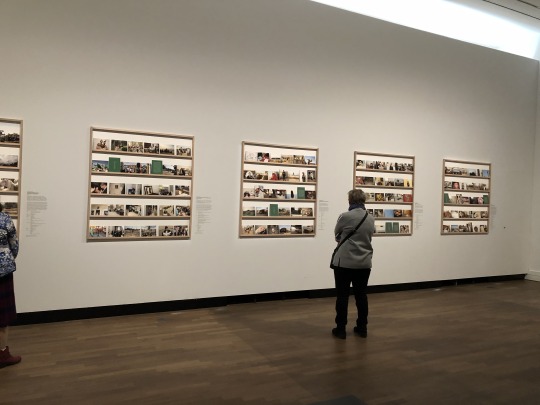
Some great photos.
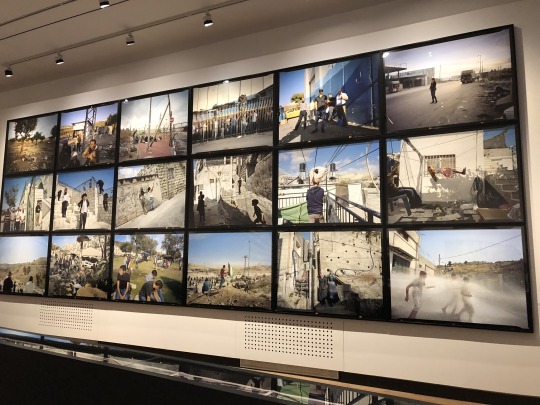
The lights in the cafe had Hebrew written inside which made a great pattern with its reflection.
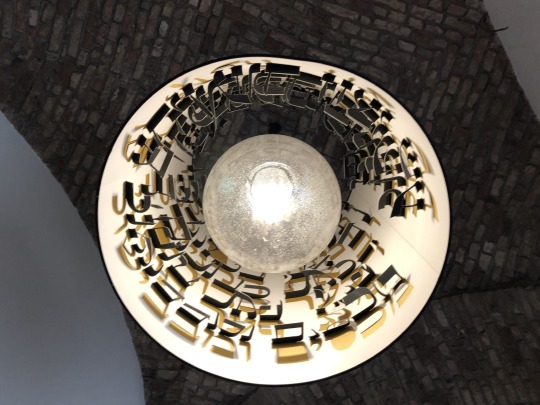
From the museum I could catch the No 248 bus back to the hotel but I went further to Alexander Platz for another look around and then the bus back. Another long interesting day. Heading north again tomorrow on the train.
6 notes
·
View notes
Text
Day 47, 6th Oct, Berlin
Clear blue skies and sunny today but very cold which I don’t mind if the suns out. Right outside my hotel near the U Bahn was a book box.
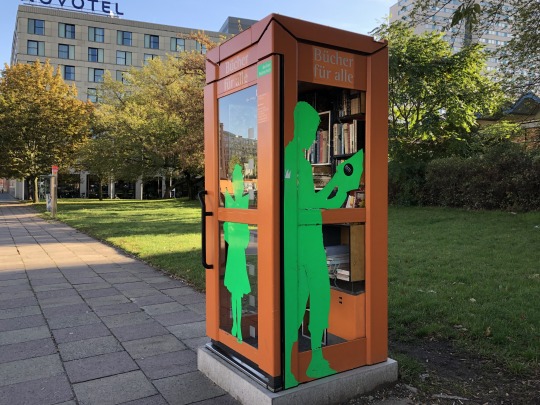
I caught the train to Bernauer Strabe. I wanted to go to a flea market, seeing it was Sunday, and Berlin has a lot but decided on this area as it also has a lot of Berlin Wall history. I have been here before but it’s five years so good to revisit the area. Next to the station you can see on the wall the famous photo of an East German soldier jumping through the barbed wire in the early days of the wall to escape. Police were waiting with a car to whisk him away to safety.

As soon as you coming out of the station there are posters about the Wall as this street seemed to be where a lot of people died and events happened more than other areas. The reason being is the wall went through people’s homes basically and at first people were fleeing out their front doors, then when they were blocked out their windows and even jumping out their windows.
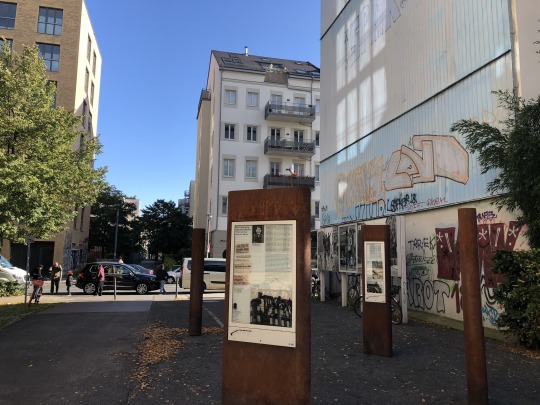
The Wall cut neighbourhoods in half and even families. Before the wall got so high people would stand on ladders so see their friends and families on the other side.
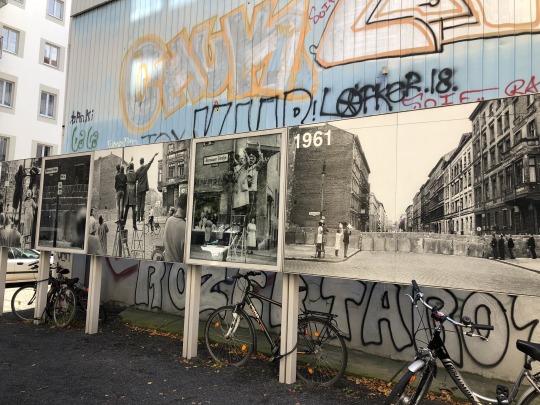
Each death remembered has a sad story behind it. This lady, Olga, was a 80 year old woman. Her daughter had got out of the home but not her mother. The people below convinced her to jump. The fire bridge had catching sheets for people who jumped. Olga jumped but hurt herself and died the next day in hospital. Memorials were built at the time for those who died but now she is remembered by this stone on the footpath.

Just along on this street was a huge flea market.

Me in my element.
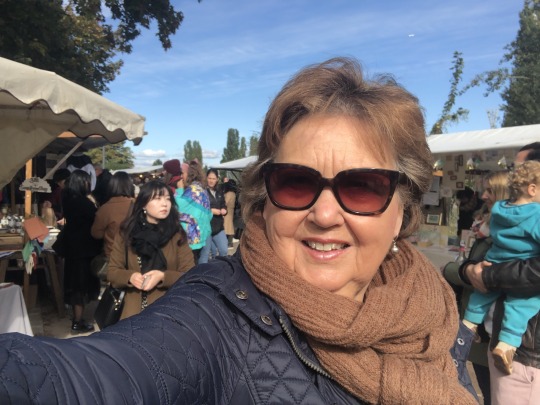
Lots and lots of boxes of stuff.
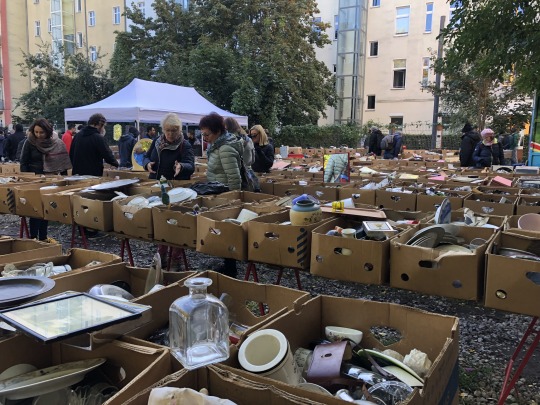
A few years ago it would have been a goldmine but now I’ve moved on from china. There was so much pink and white English china there. I would have been in seventh heaven.
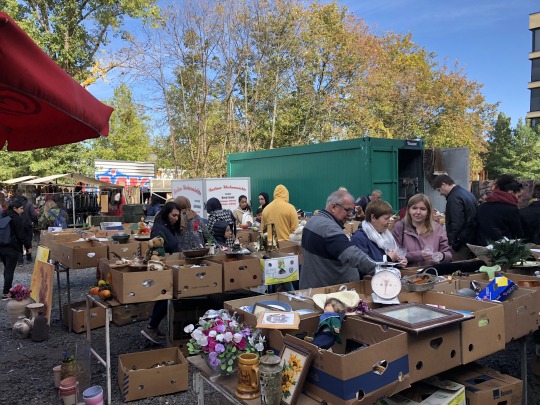
I only ended up spending €3.50.

Back along the street to where all the Berlin Wall information was. I liked this art. I interpret it as the knife, or wall, cutting through the heart of people during 1961 to 1989. It could be something completely different.

Part of the original wall and where some is missing rusted poles are placed. The green grass was where the death strip was located as by the end there were two walls with a strip with guardhouses all the way along.

These are some of the people who lost their lives trying to escape from the East.

This area is a considerable section of wall.

An original guard house within the two walls.
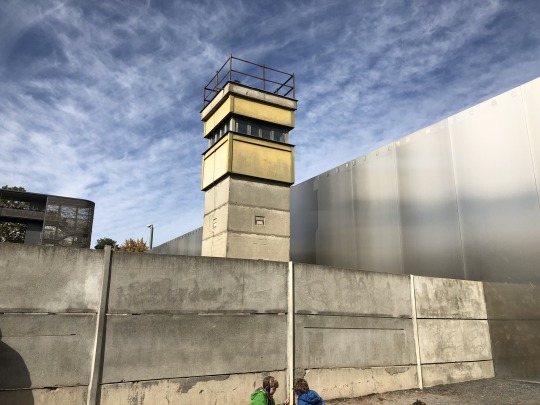
I caught a tram back to Alexander Platz where some Octoberfest activities were going on.
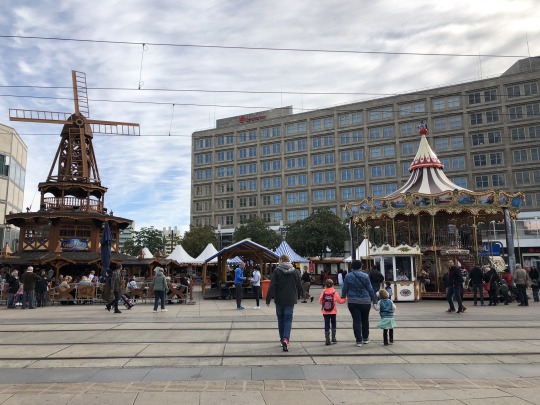
Typical German biscuits.
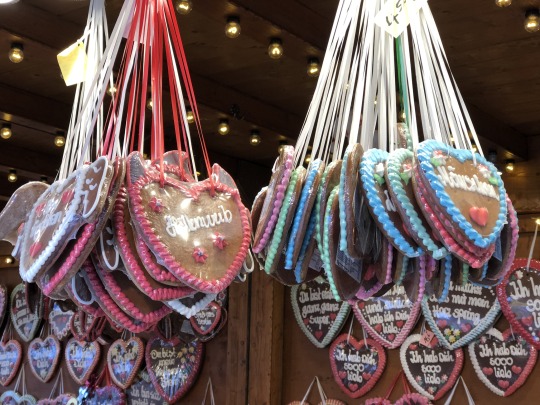
Colourful stalls.

Lots of German food.
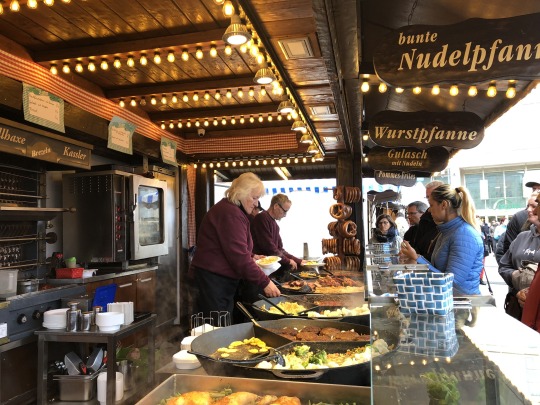
A bit later on I was joining an ‘Alternative’ free walking tour starting at the base of the communication tower.
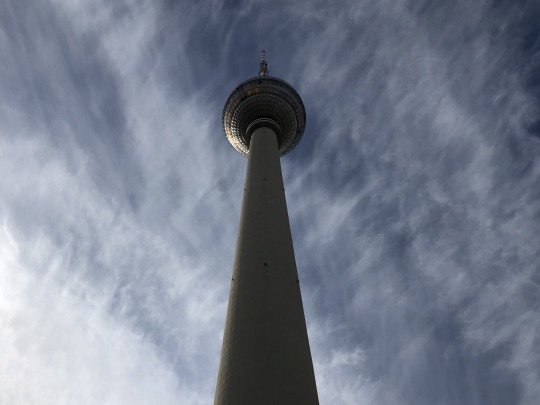
Our first example of street art is done by a group and they put this all over the city. It’s 1UP. It’s from a Mario game. Berlin has a lot of graffiti which I’m not into but it was interesting getting the back story. I do like street art, though.

This is one of El Bocho’s work. El Bocho is a Berlin-based street artist using graphic posters to tell stories throughout the city, and across the world. One of his most recognisable series features the twisted character, Little Lucy, who became famous on the streets of Berlin as the imaginary little girl intent on killing her cat. In this one Little Lucy has a mouse to lure the cat and ‘gift’ in German is poison.
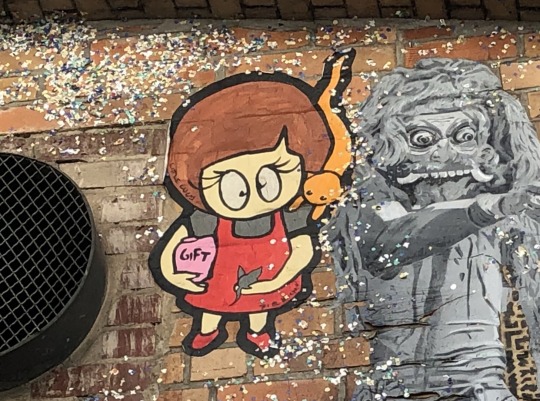
These paper cuts outs were interesting. Berlin has a huge techno dance music scene with a lot of clubs where people go. No one is allowed to take photos inside and it’s policed very thoroughly. However, this artist took some photos of just random people and put them up on walls. It could be anyone and in these clubs anything goes.
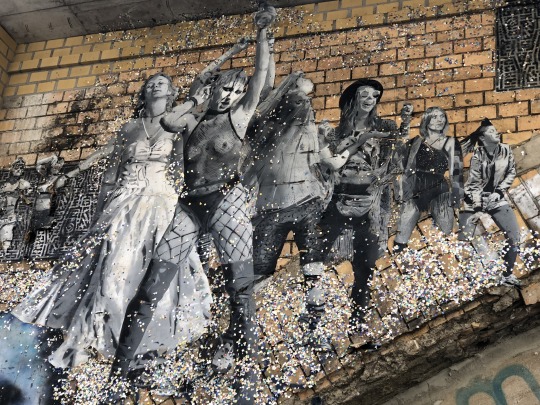
This was our guide who was very knowledgeable and full of information. These cards were done by a French artist and this type of art takes a long time and is fairly unique. It’s in the vain of Banksy. It is Angela Merkle as the Queen of Hearts.
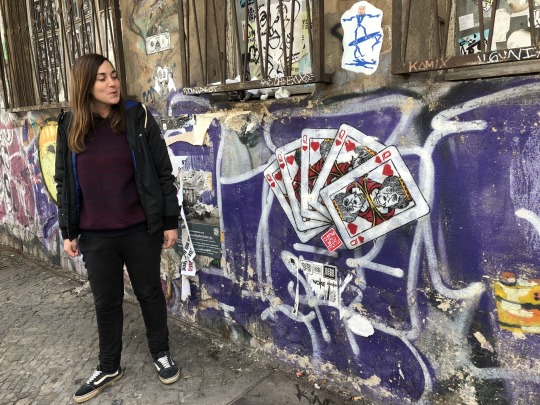
We turned off the street where there were some ‘stumbling stones’. This used to be a Jewish area. This family all died in Auschwitz.
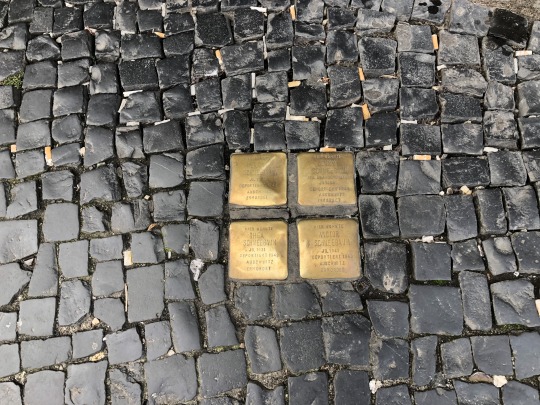
Immediately as you turned into the courtyard it was a great space. I like that rustic look. Now there are bars and cafes in where people used to live.
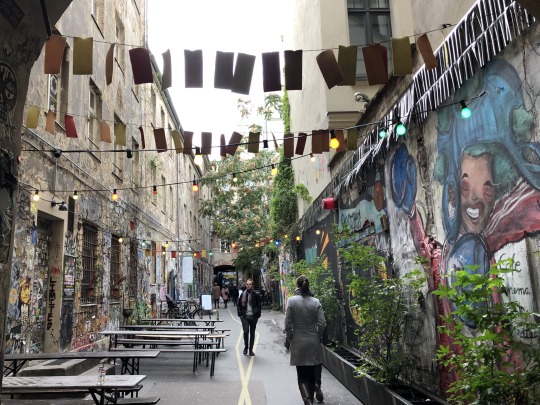
This man used to have a workshop here during WWII. He was able to hide some Jews with the help of a friend who was a prostitute and knew people in the underworld who could get more ration cards to feed those who were hiding. Another museum to visit next time,
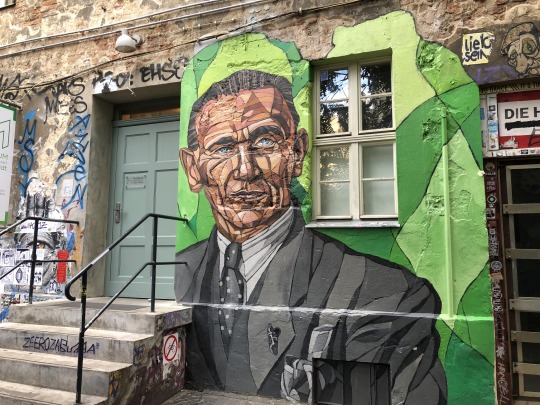
Looking back out to the street. Along the wall is street art that changes frequently. There is someone who oks what is to be on the walls.
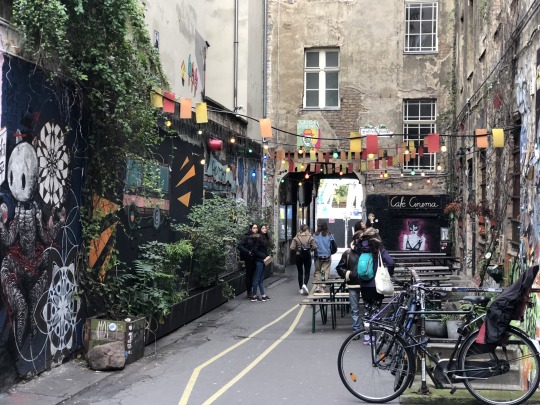
Another quaint area.
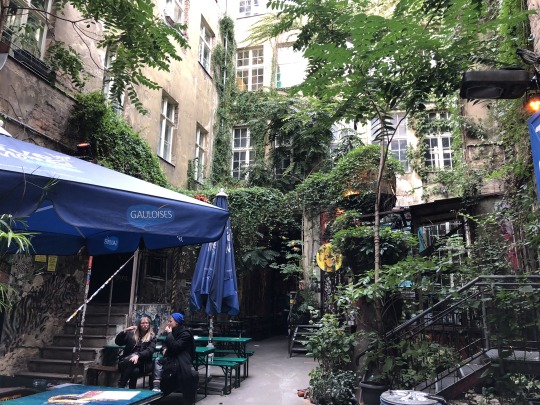
I like this whole courtyard and nooks and crannies. Not sure who the painting is of.
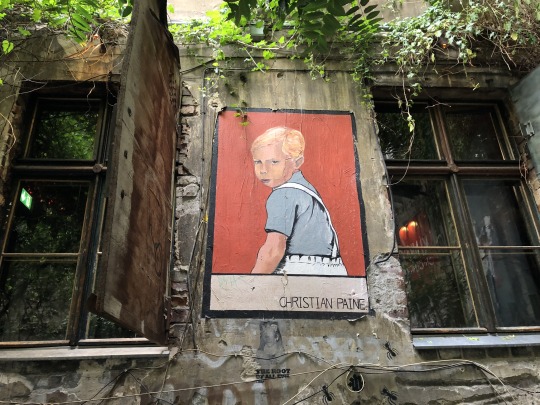
There was a museum about Anne Franks and other Jewish stories. That will have to wait for another time. The portrait of her was good.
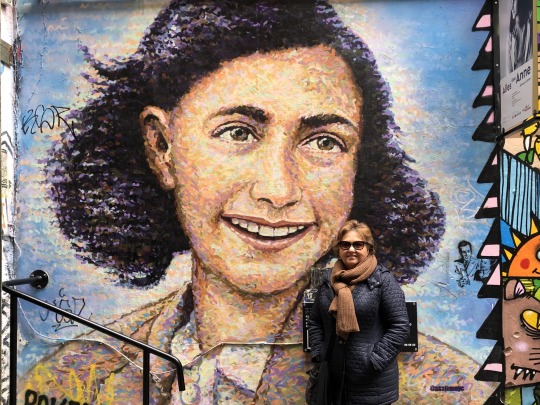
Also in the courtyards were a couple of other Little Lucy. This one she has made a swing out of the cat.

Little Lucy has a gun here for the cat. All a bit warped but interesting to find as you are walking the streets.
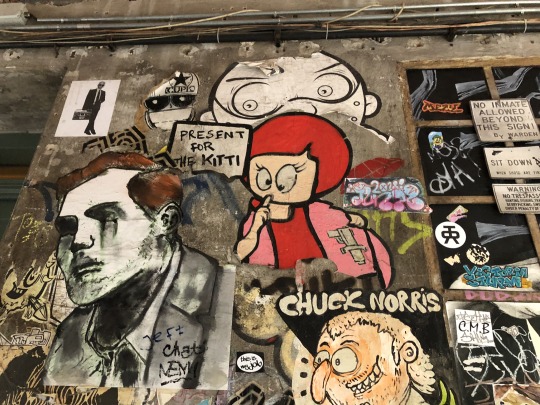
Next we caught the S bahn to Kottbusser which now is quite close to the centre of Berlin but in the 70′s it was fairly empty and on the outskirts. At that time Germany was in need of workers so they put the word out to countries and the biggest number of men came from Turkey. They settled in this area. They were only supposed to come for a year or two earn some good money then go back to Turkey. That didn’t happen and they stayed and bought their families over. Now this area has Turkish shops, bank, travel agent and mosque. However, the area is going through a gentrification process which is changing the area again. Germans are a country of renters and there are strict rules about rents etc so it’s difficult to force people to move. With shops it’s easier as rents can be put up.

This area has always been fairly politically active and to the Left so different changes have been fought over and stopped.

The Cosmonaut Mural was painted in 2007 by Victor Ash and is considered to be the largest stencil drawing in the world. Like much of Ash’s work the Cosmonaut explores contrasts between the subject matter and the environment that it inhabits. The unexpected sight of an unmissable, massive, weightless astronaut immediately leaves a lasting impression on pedestrians. Ash was born in Portugal in 1968 and raised in France. He currently lives and works in Copenhagen, Denmark.
The red and blue symbols are done by another group in Berlin more recently who abseil down buildings to do their paintings. They film themselves and put it on utube.
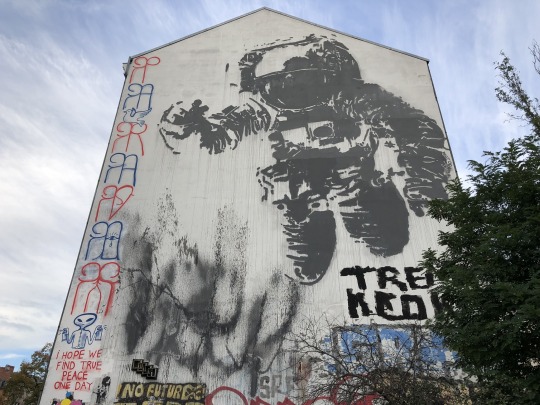
This used to be a hospital but when built the Emperor at the time was very much into liking church architecture. Now it’s a cultural centre.
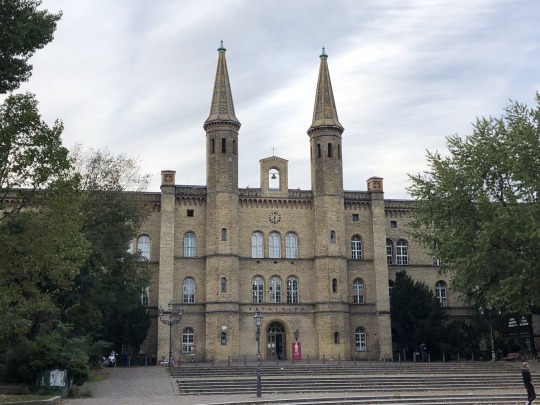
This green strip,now park area, was once the ‘‘death Strip’ in the middle of the Berlin Wall. All over the city you can see where the wall was built.
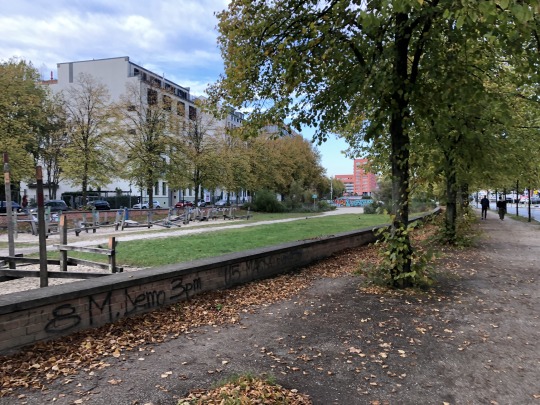
We walked back to the river. All the way along you can see new buildings been built. Unlike Germany Berlin is not a wealthy city as it doesn’t have industry like the west of Germany does. As one gay Mayor said ’we might be poor but Berlin is sexy’. The city has a slightly alternative feel to it but like everywhere more money is coming in and new buildings built changing the scene. Below the construction is an area called YAMM which was built on a disused area. It’s full of bars and has an African lean. There are other places like this further along the river and in other disused train sheds etc but eventually development will push them out.
The tour finished at this point. A fabulous wander through the streets of Berlin.

I called in to have a look at YAMM. It was a pretty friendly place

The music was good and you could get up and dance if you wanted to. I declined but was happy to watch.

It had been a long day and getting very cold so that was pretty much me done. Ready for more adventures tomorrow.
2 notes
·
View notes
Text
Day 46, 5th Oct, Berlin
Heading to Berlin today. Slowly making my way north to Norway. Flying takes up a lot of time. The airport was an hour out of the city. I just caught a bus and then you have check in and security etc and then a bit of a wait.

Lovely mountains as a backdrop to the airport. The plane was fairly full but I was lucky and got three seats to myself.

The flight only took one hour and twenty minutes so that part was easy.

From the airport it’s about a 40 minute ride on the train to AlexanderPlatz which is a major transport hub.

At Alexanderplatz it’s easy to get on the U2 line to Spittlemarkt where my hotel was located. This is the third time I’ve been to Berlin and I’ve stayed at the same hotel each time. It’s in a very convenient location and very comfortable.

After checking in at the hotel I didn’t really feel like sightseeing so decided to walk to the big shopping centre, Alexa, which was in walking distance. The sky looked a bit ominous. It was very cold out.

I have hardly been into any shops so I thought a wander in a shopping centre would be good. However, I didn’t last long but did have my dinner there. The Dom in the distance.

I have a full day planned for tomorrow so it was nice to be able to do very little today.
2 notes
·
View notes